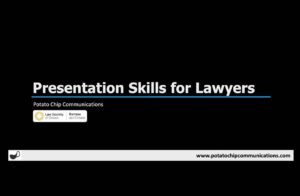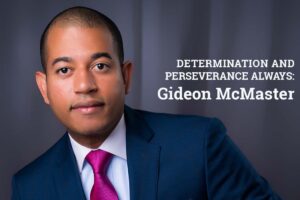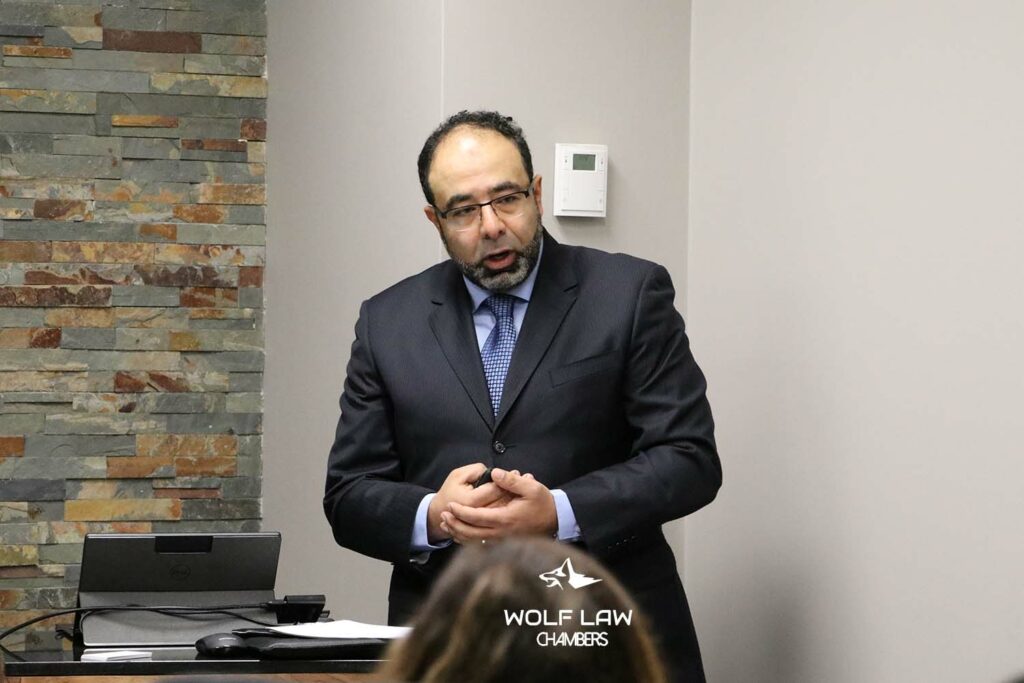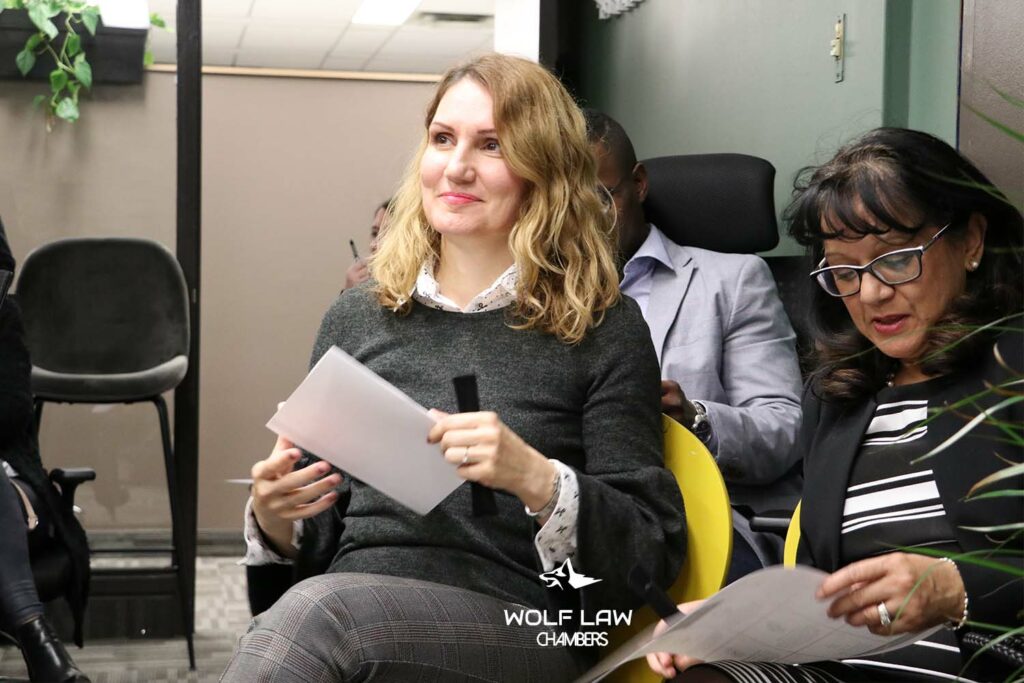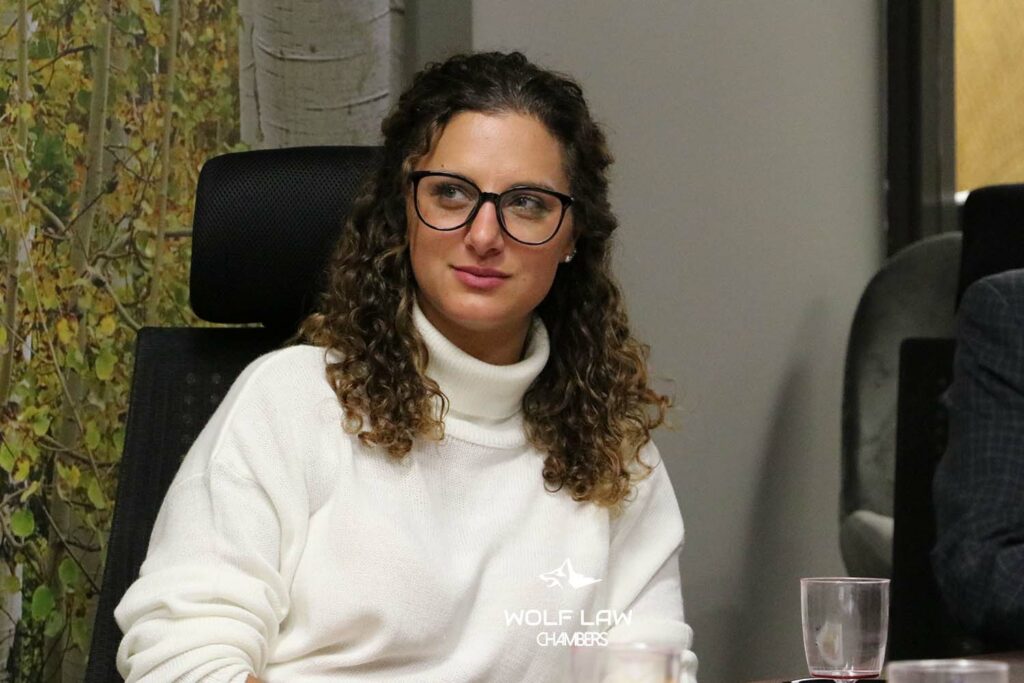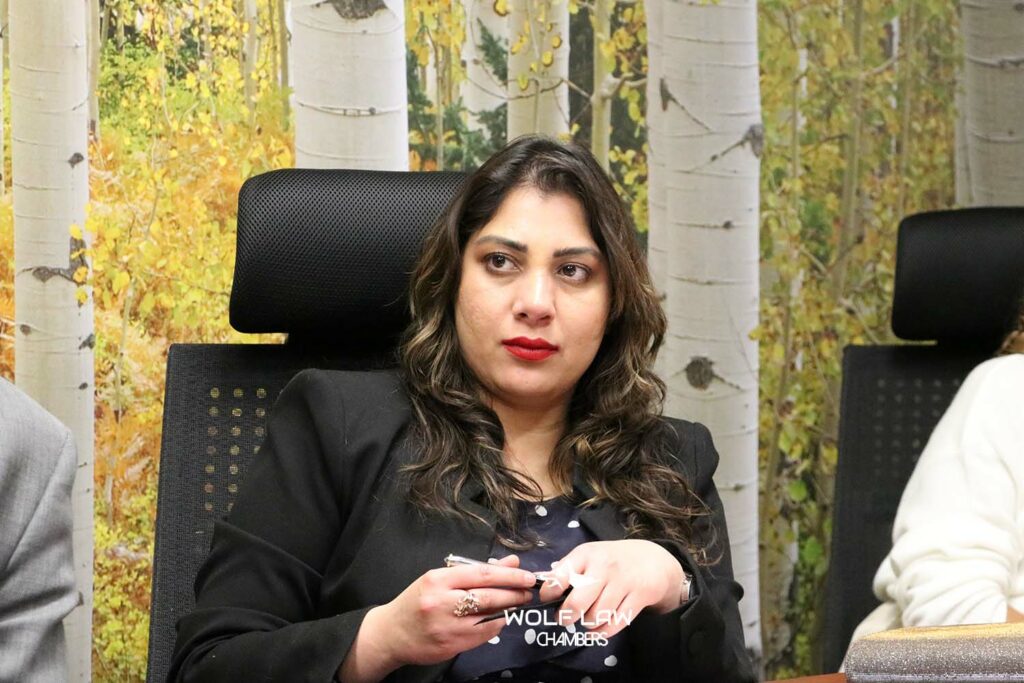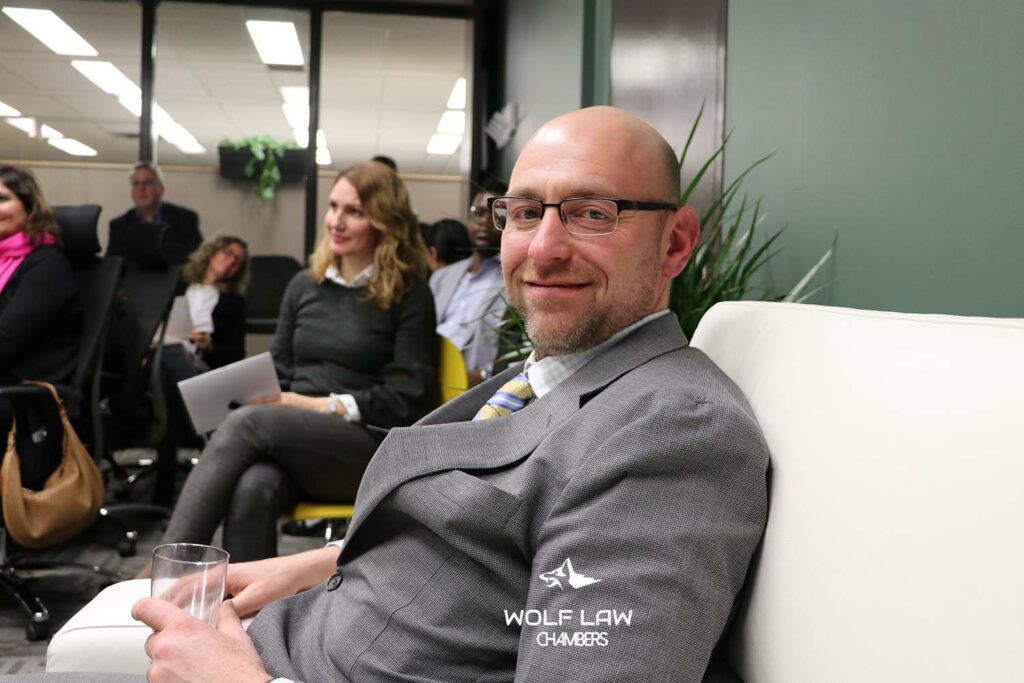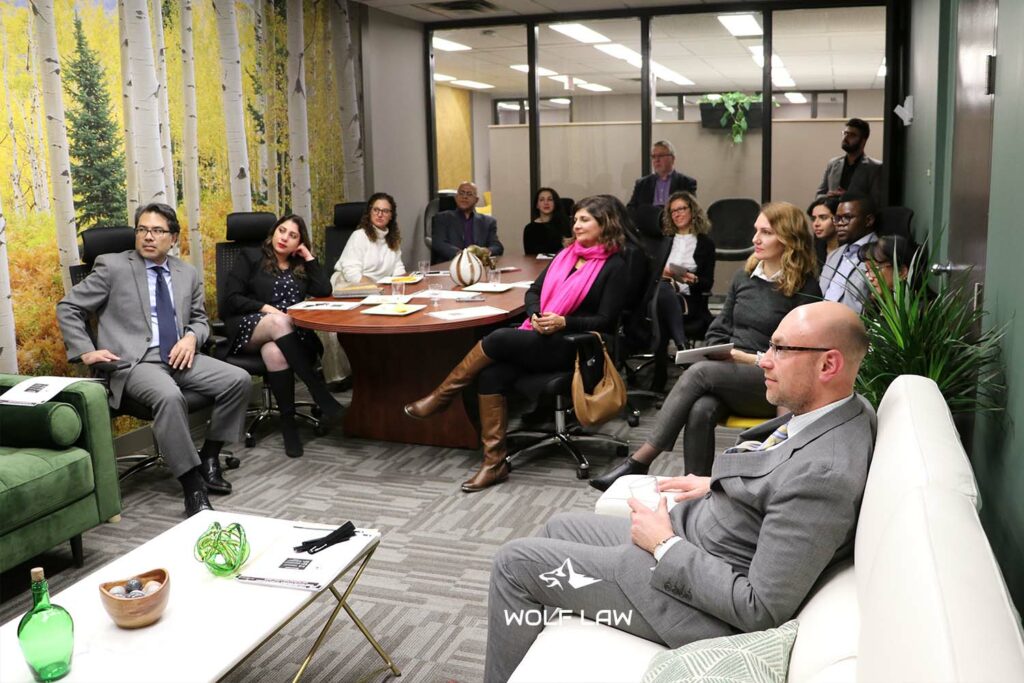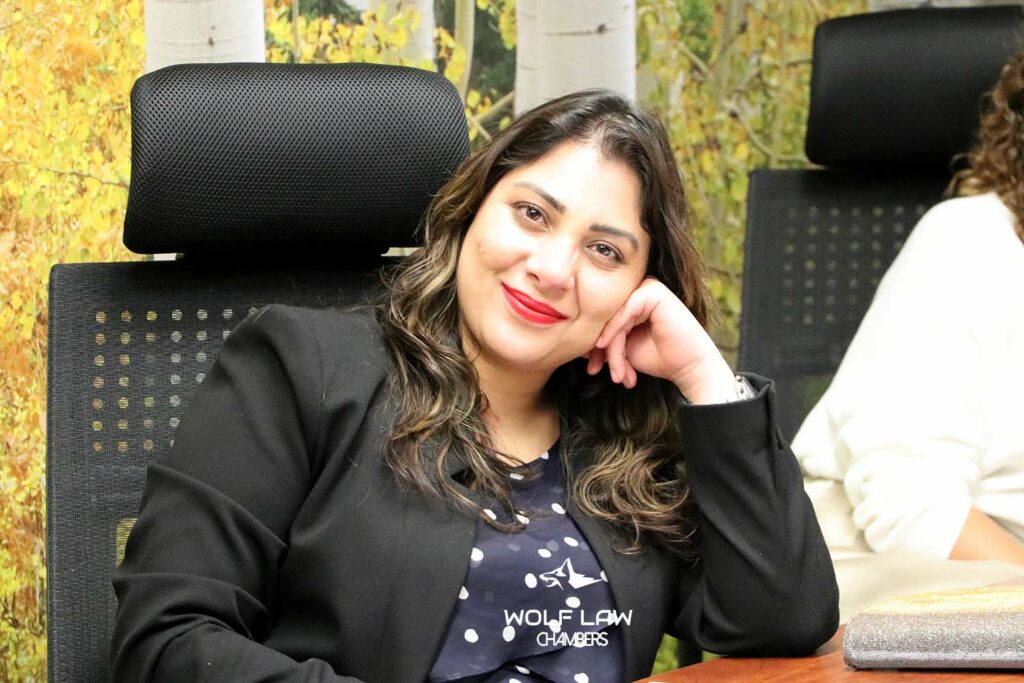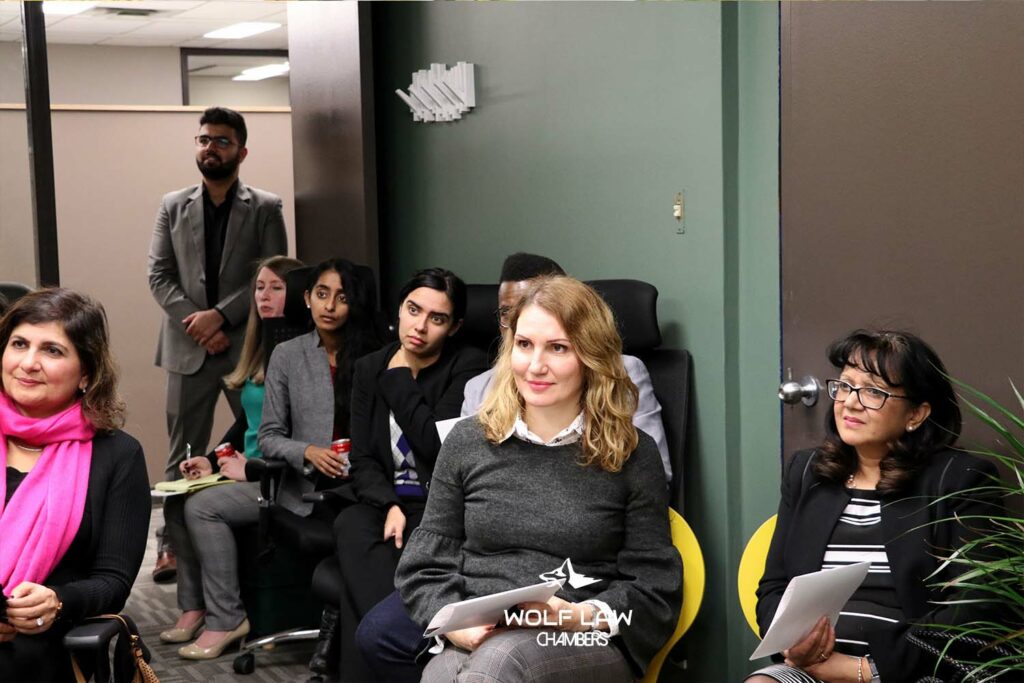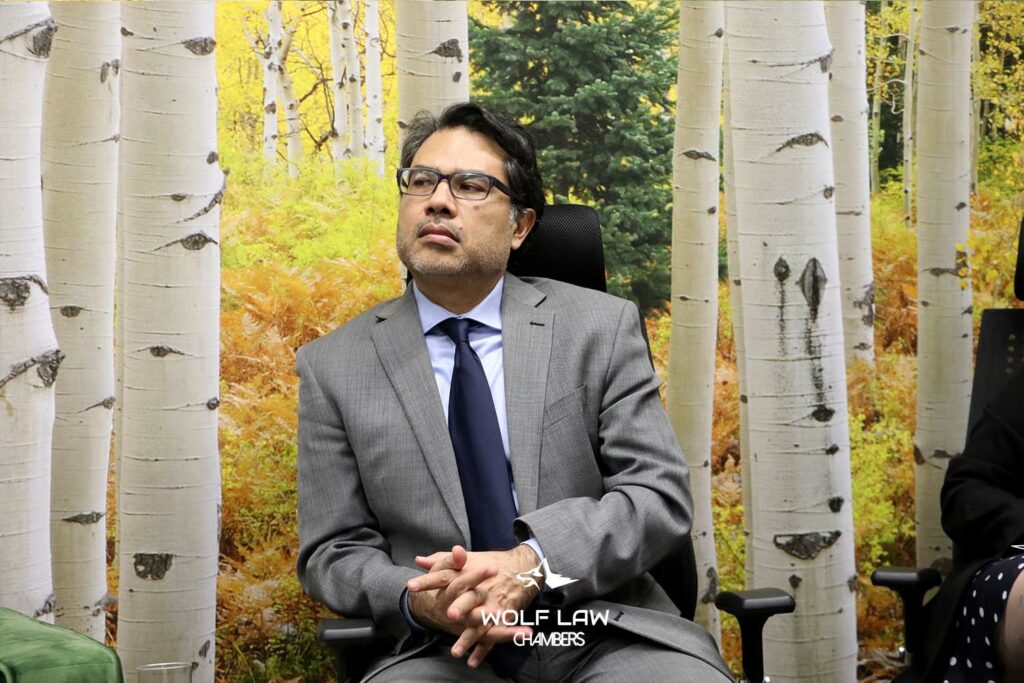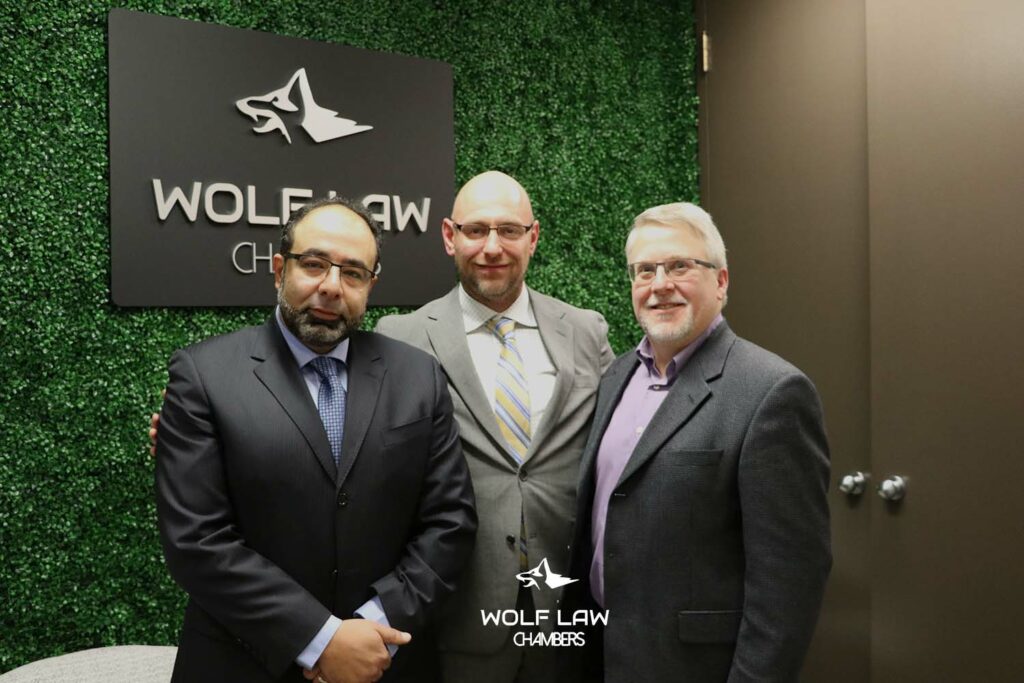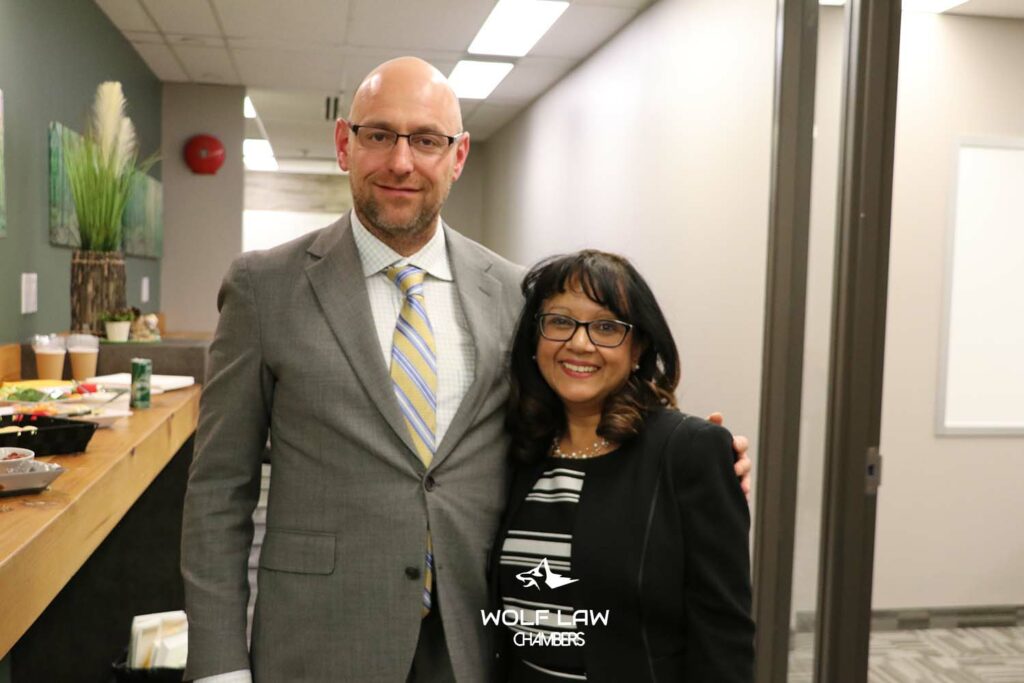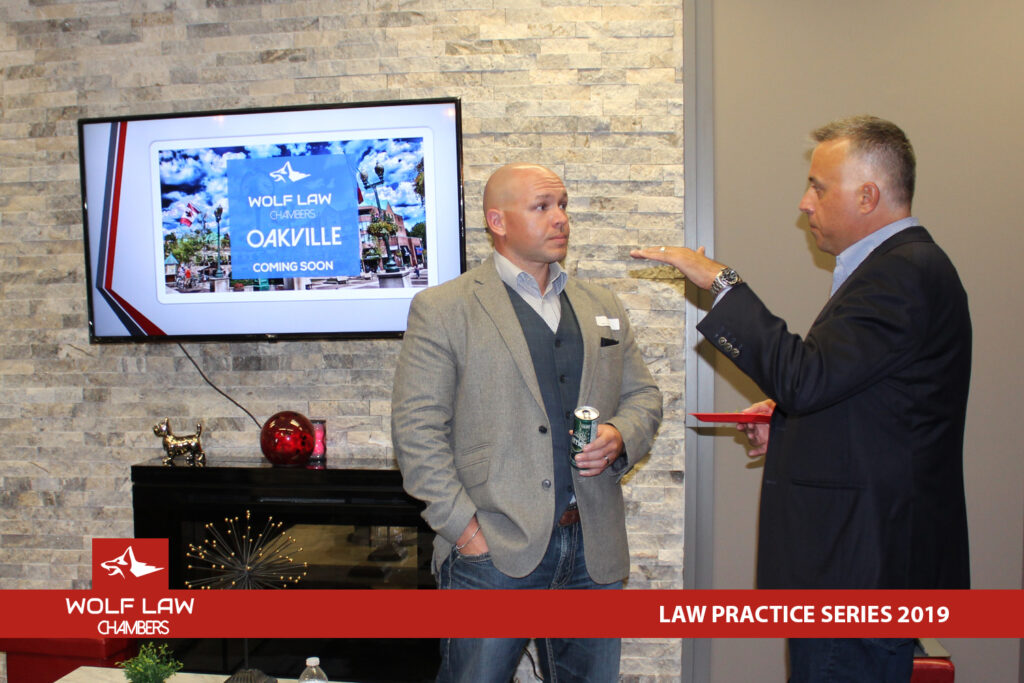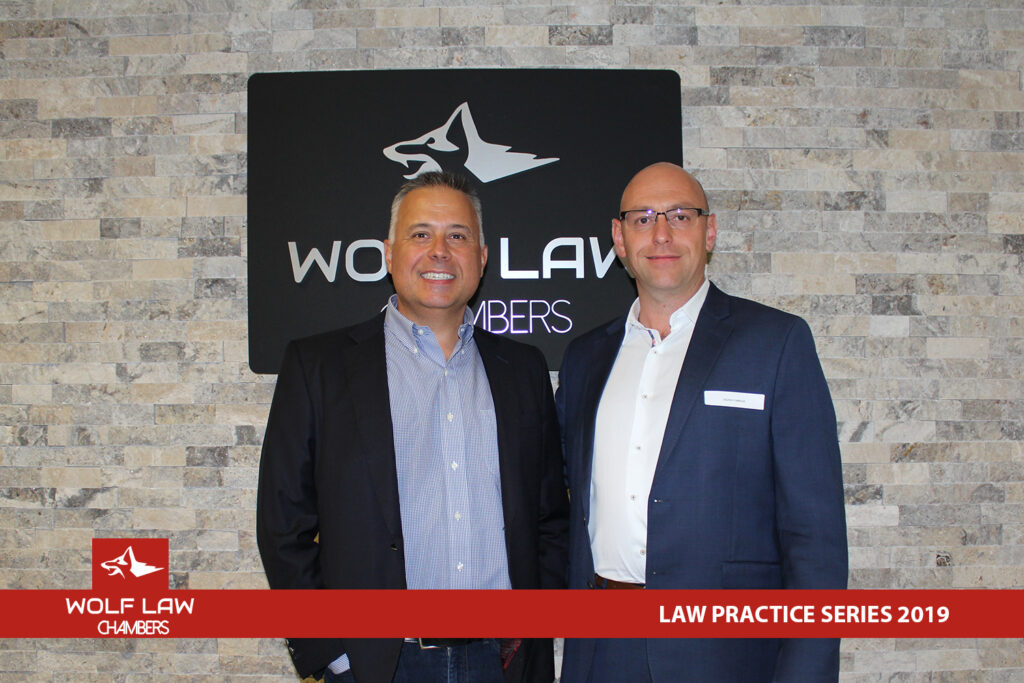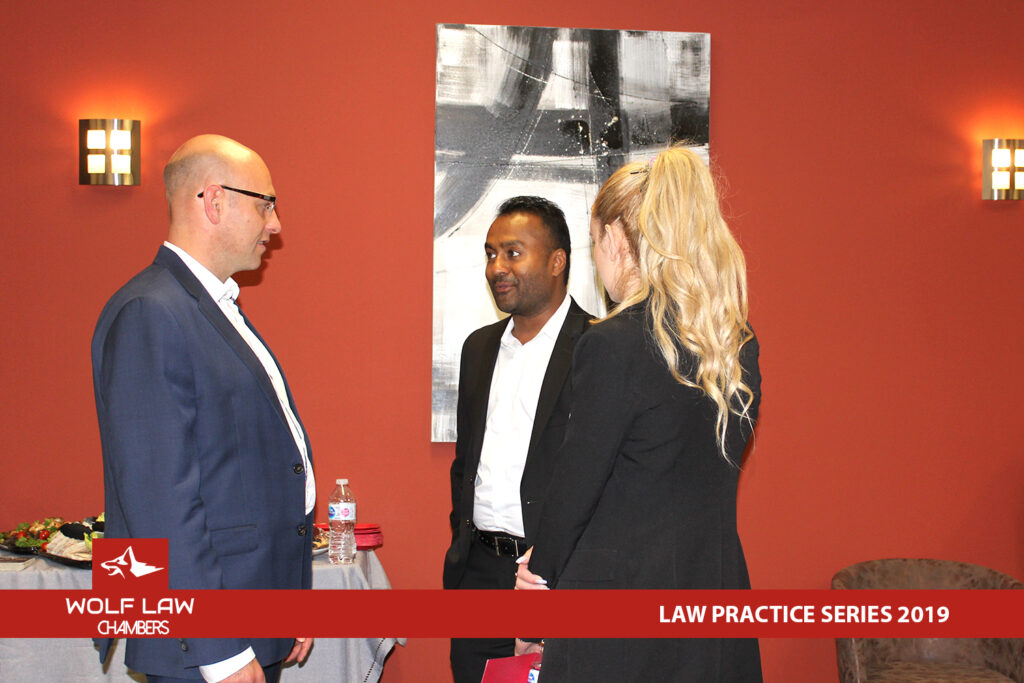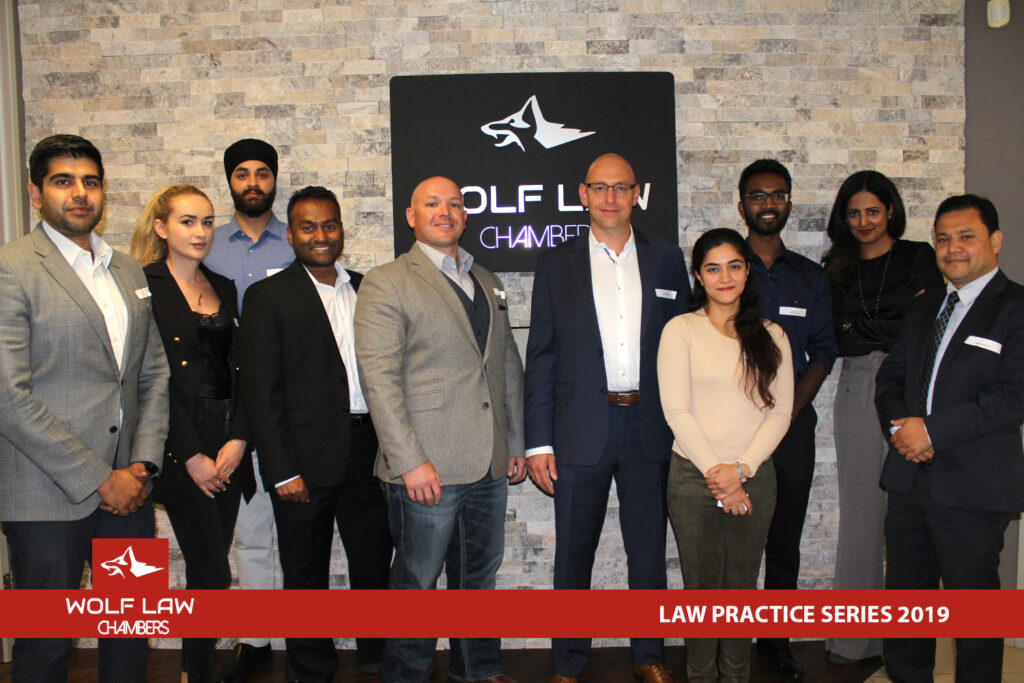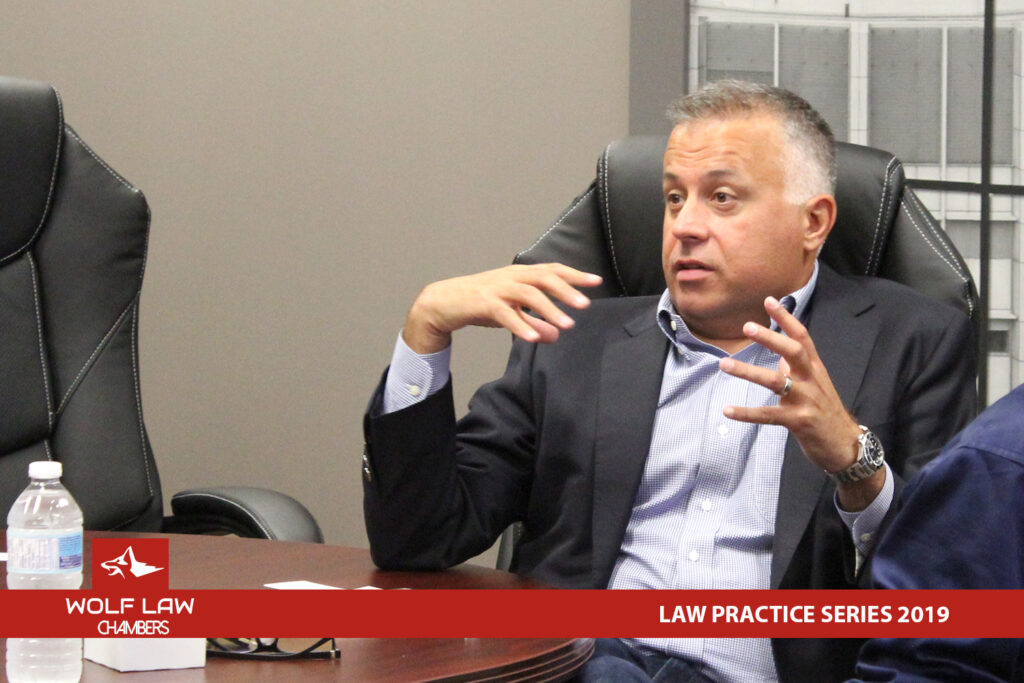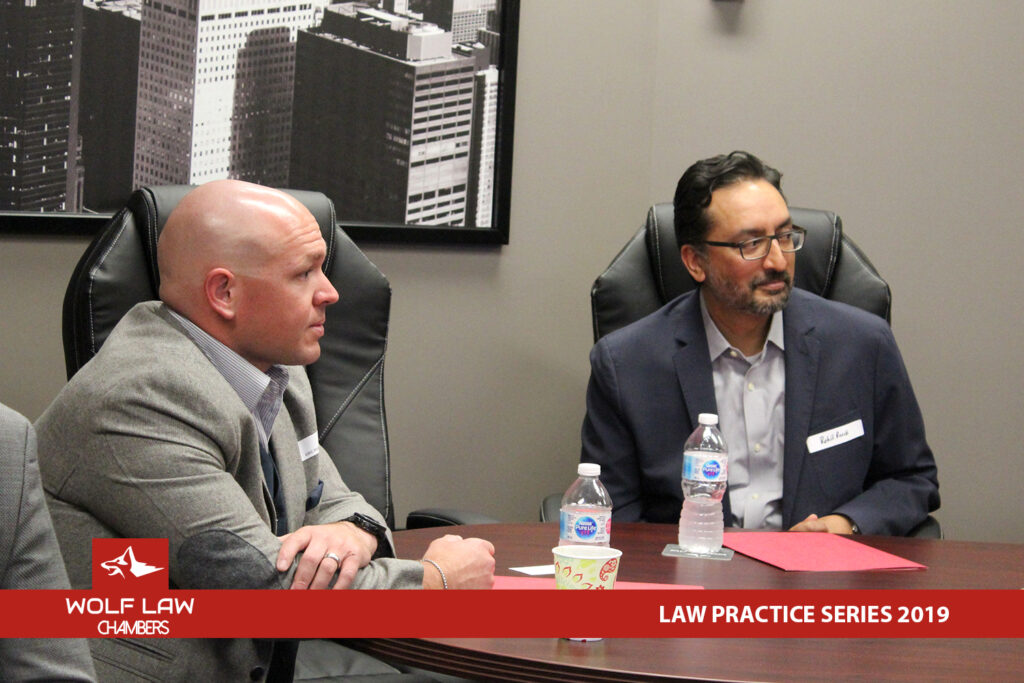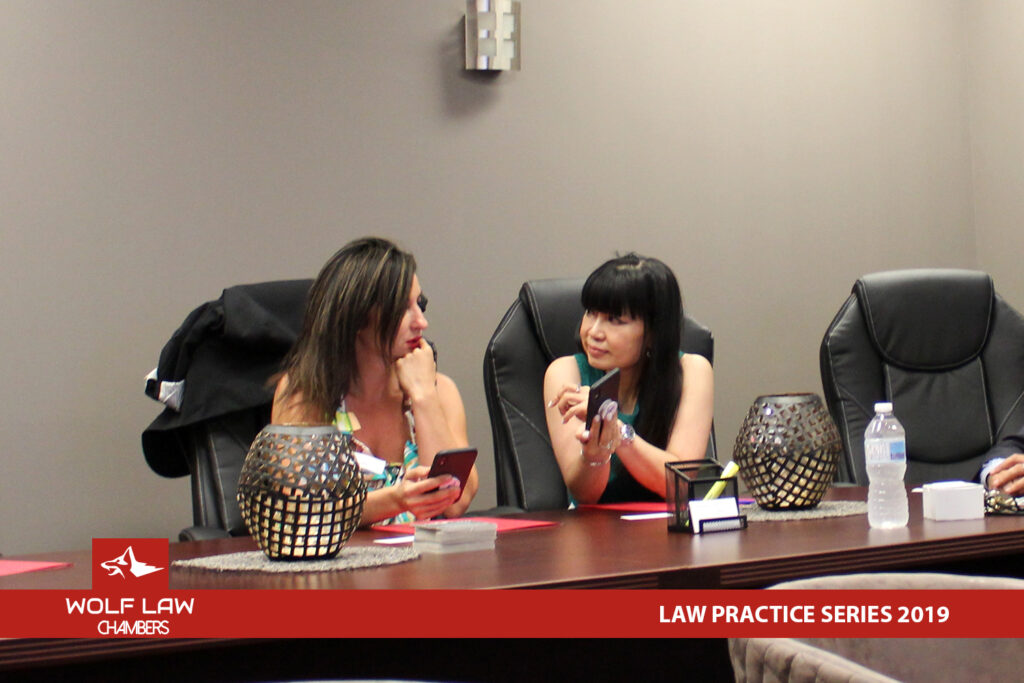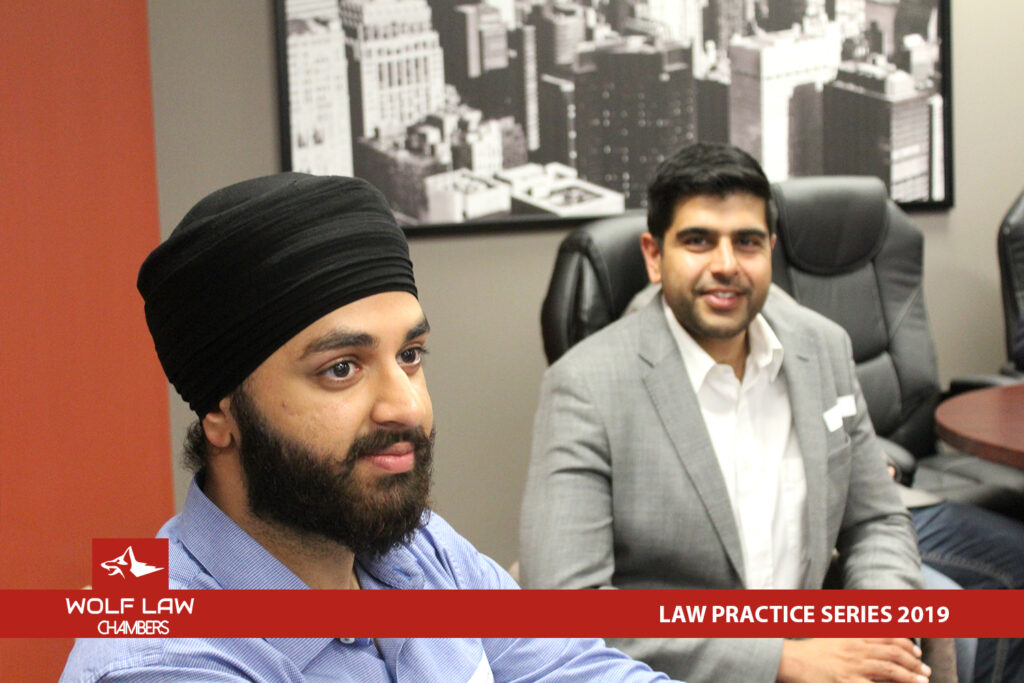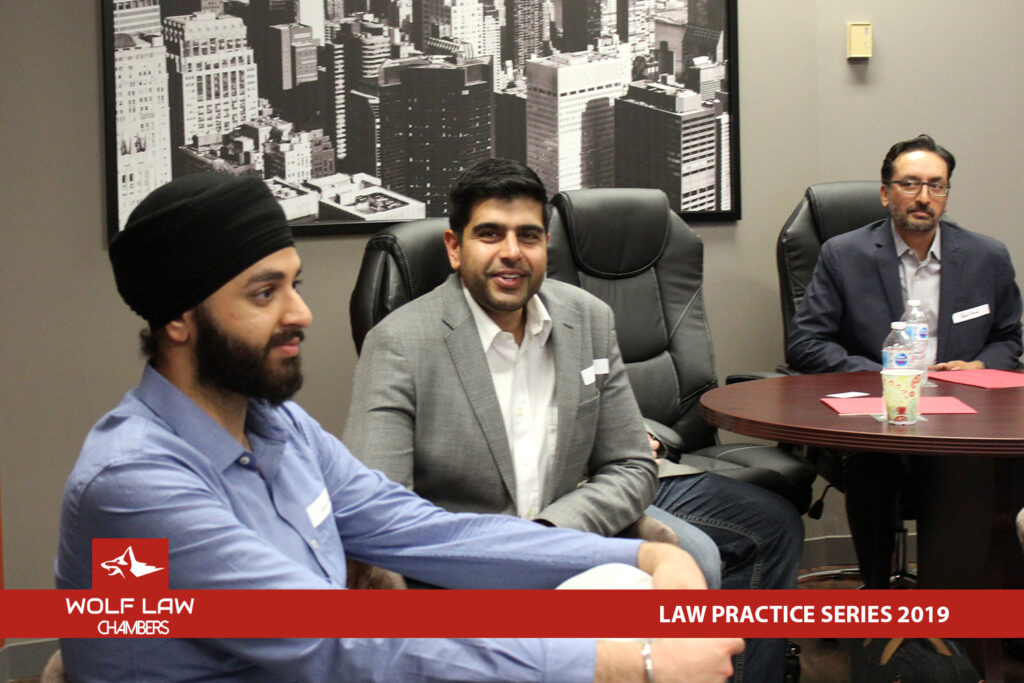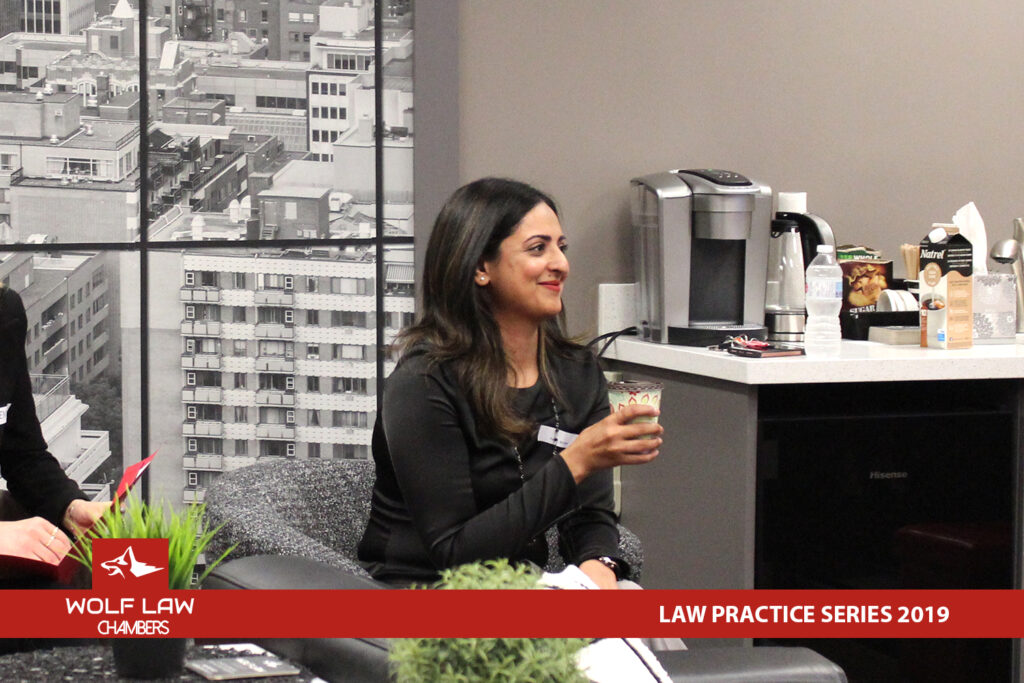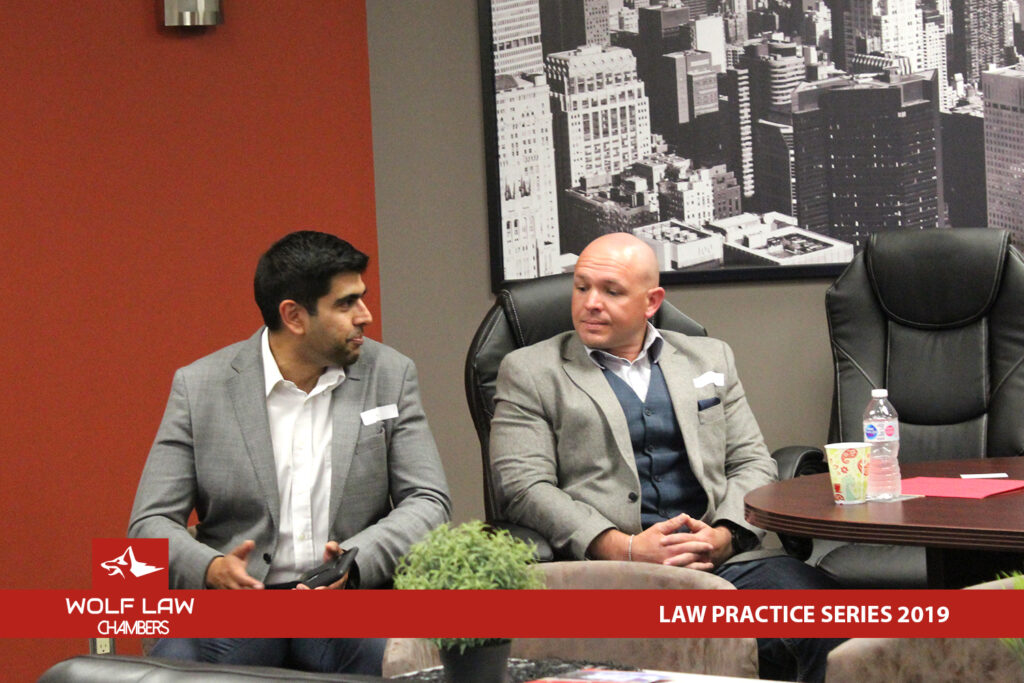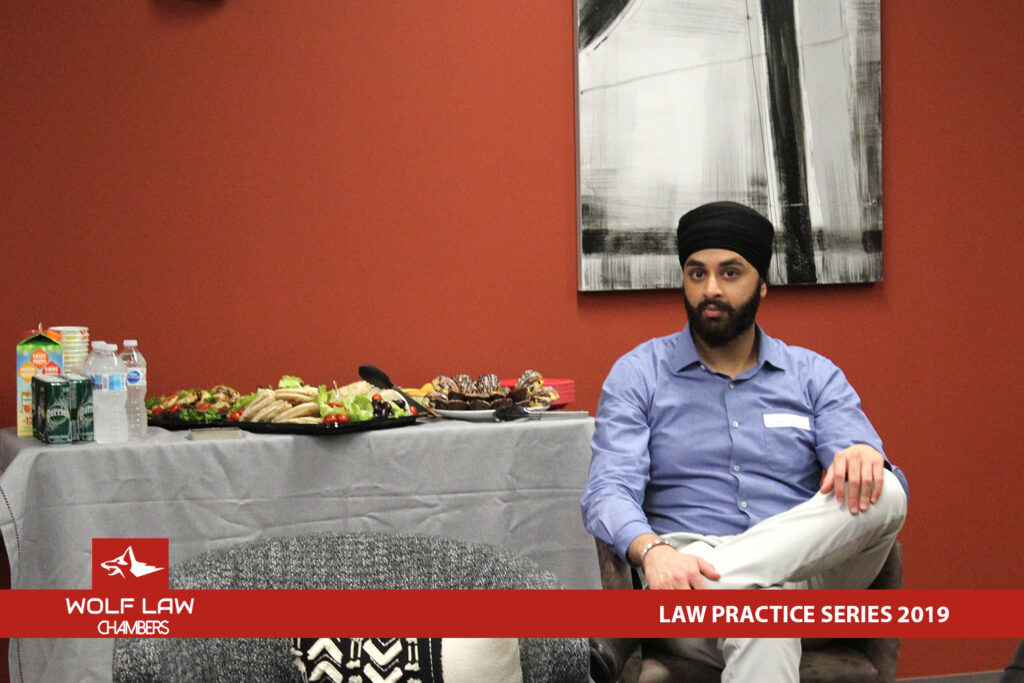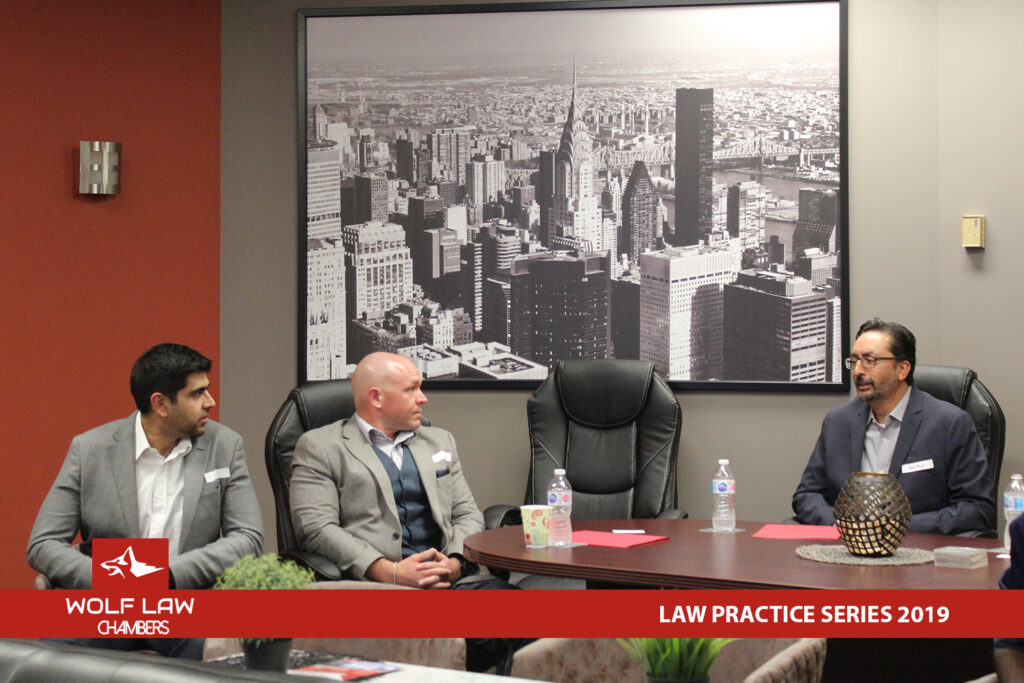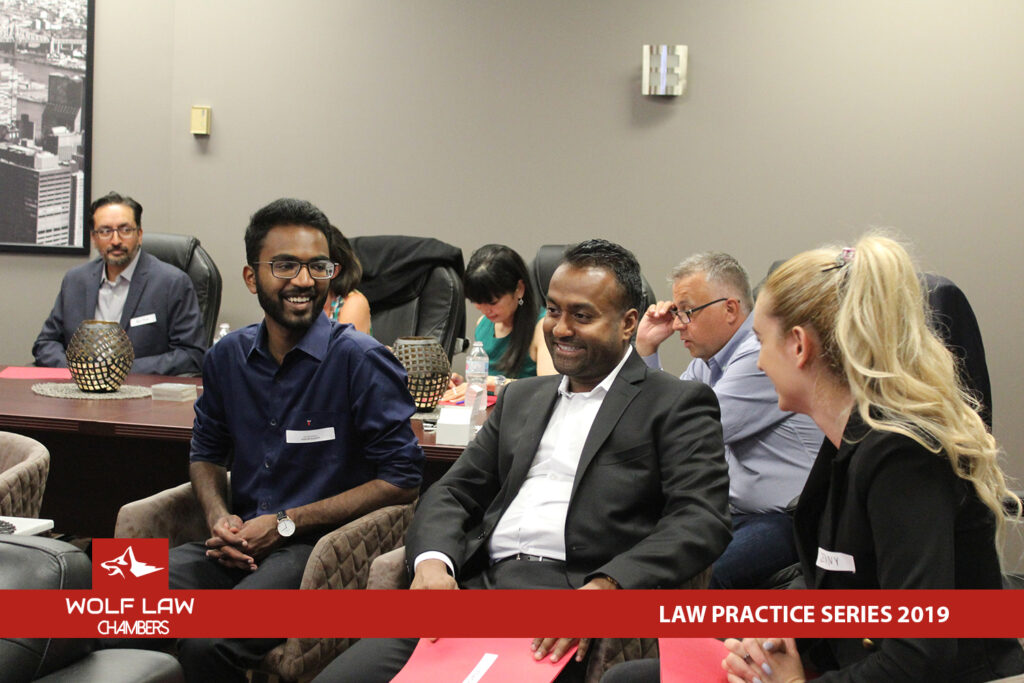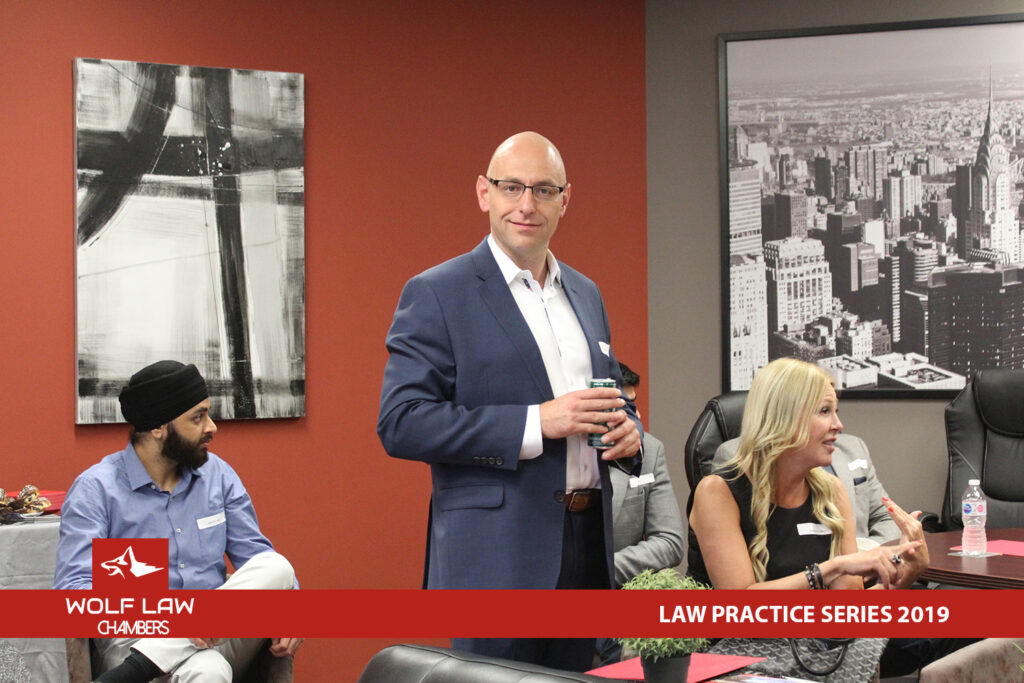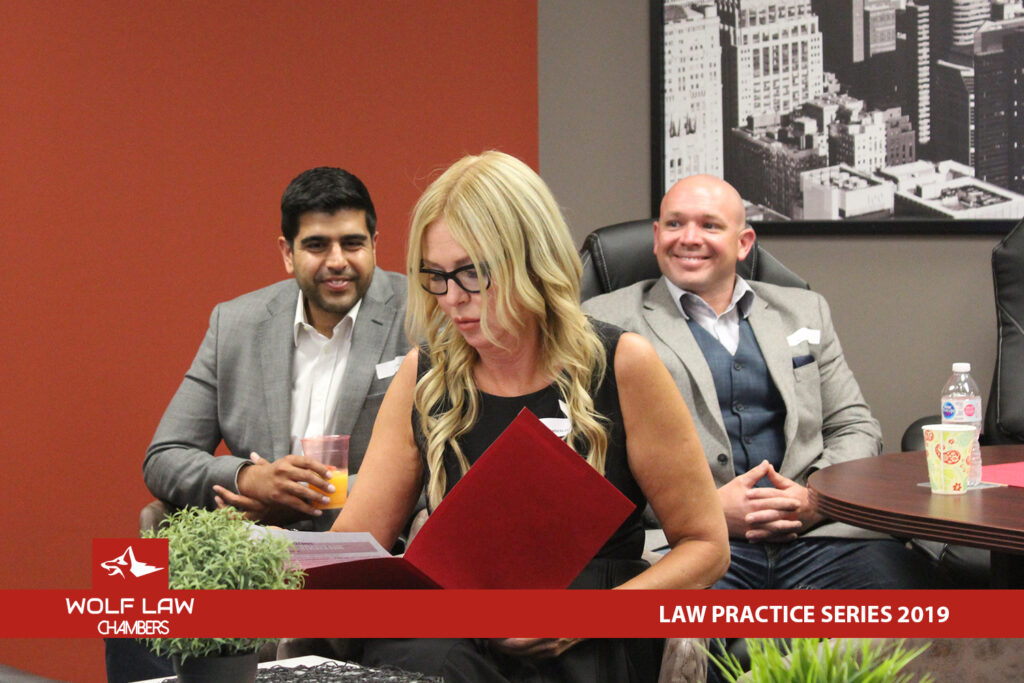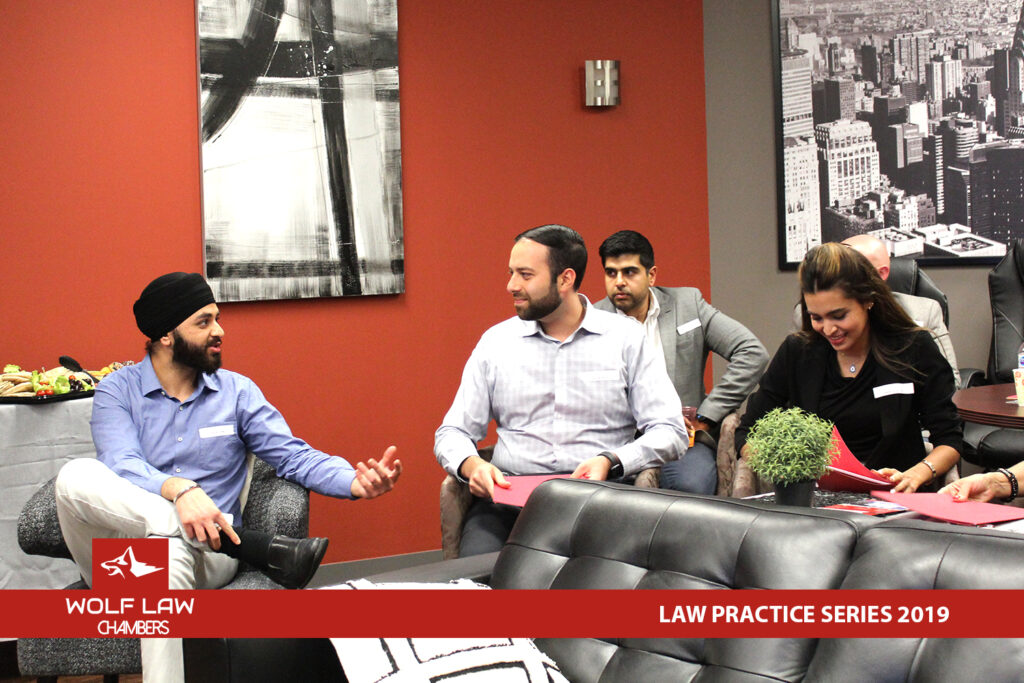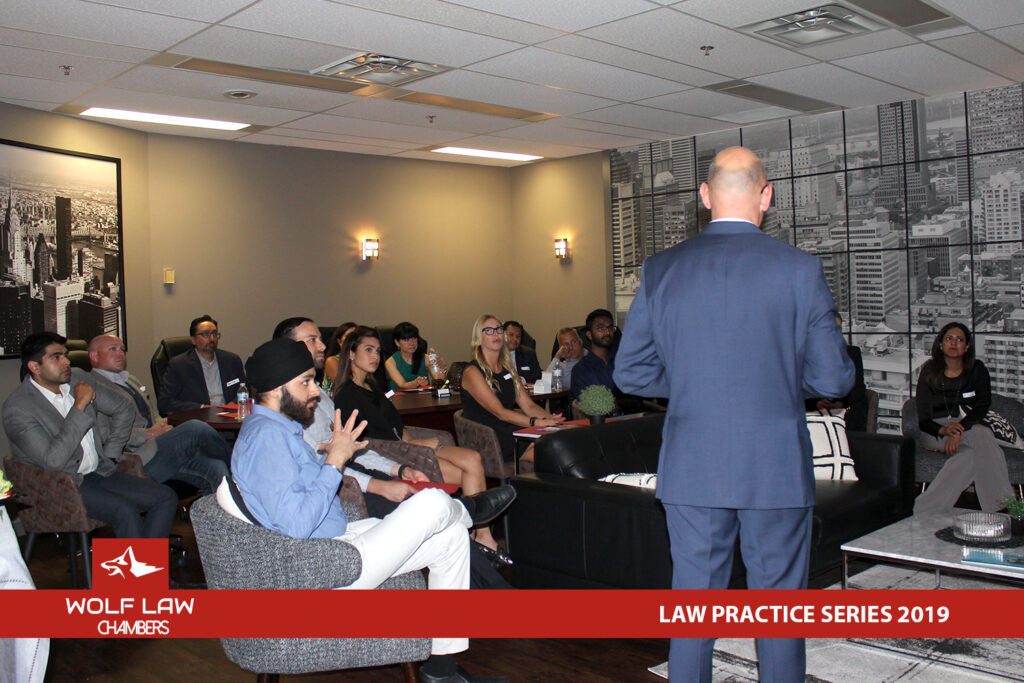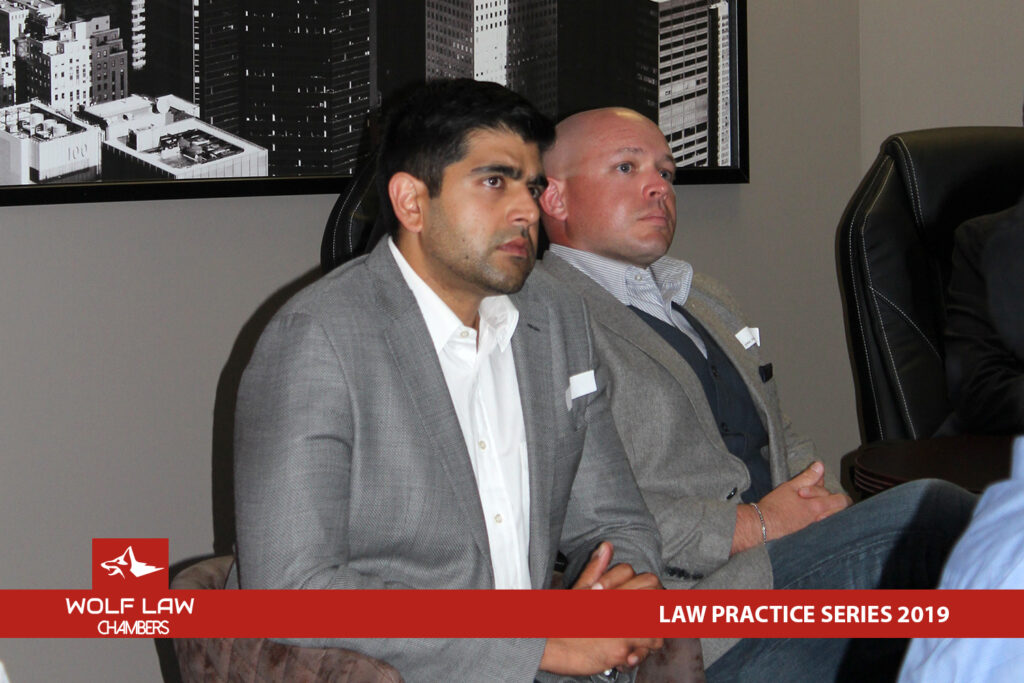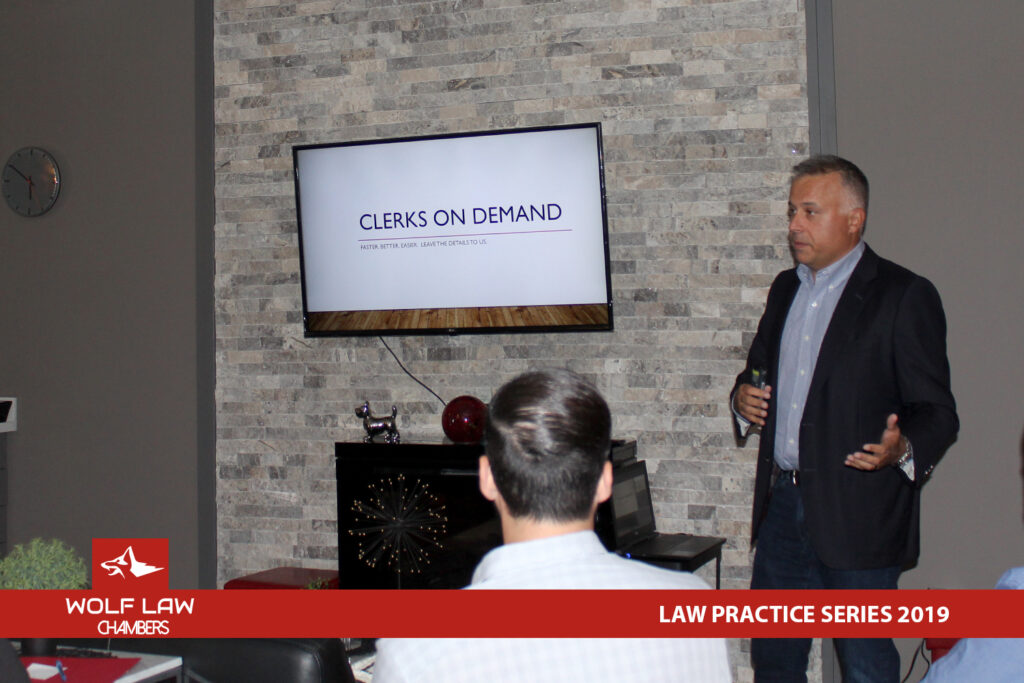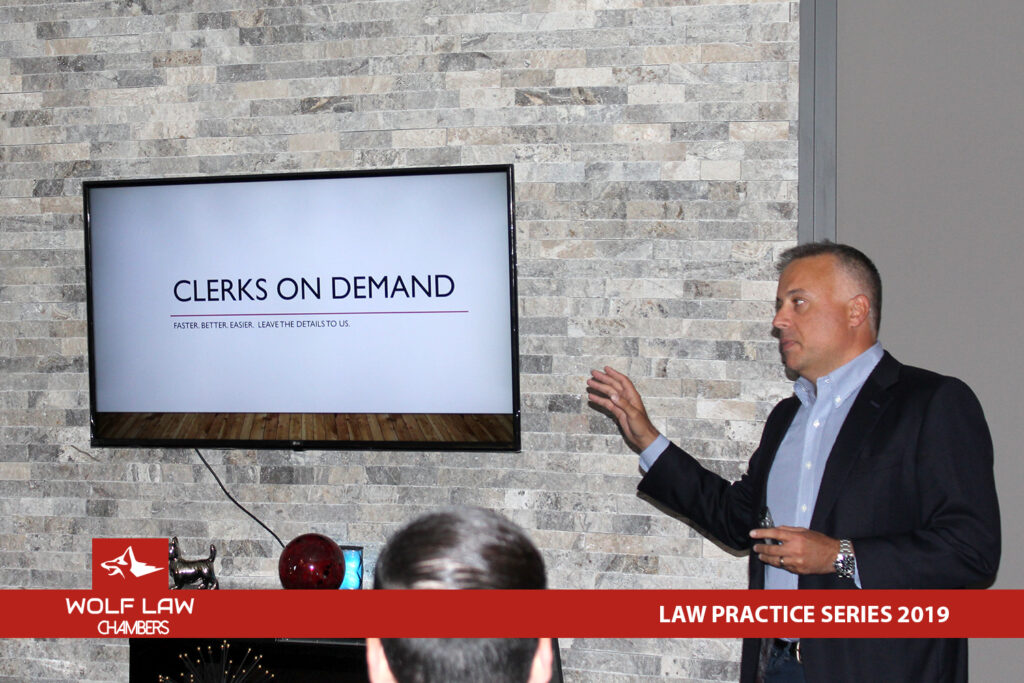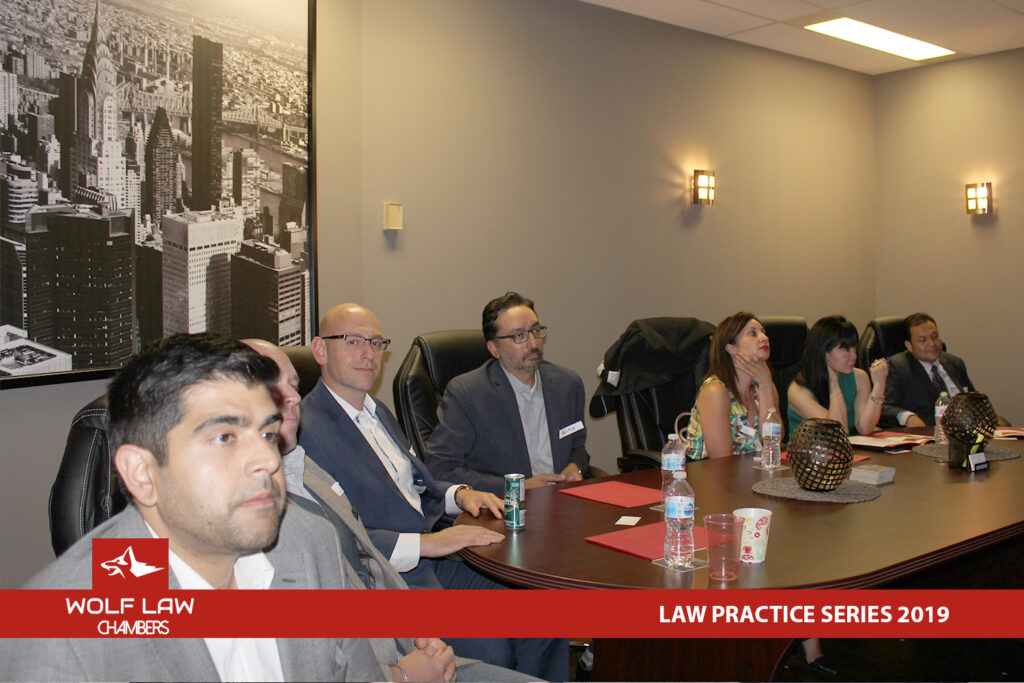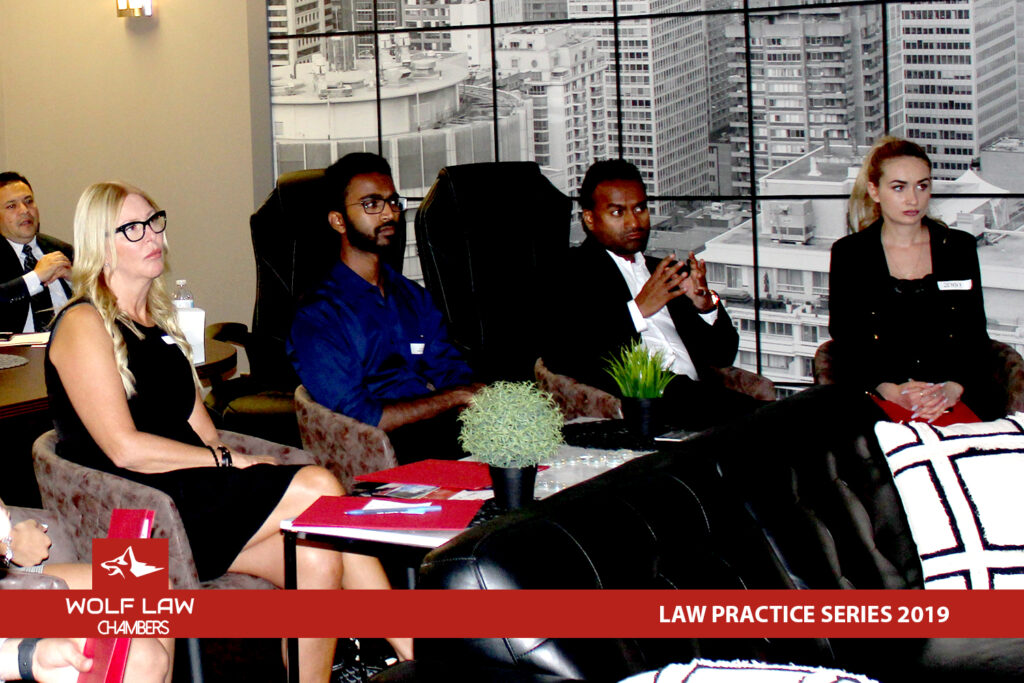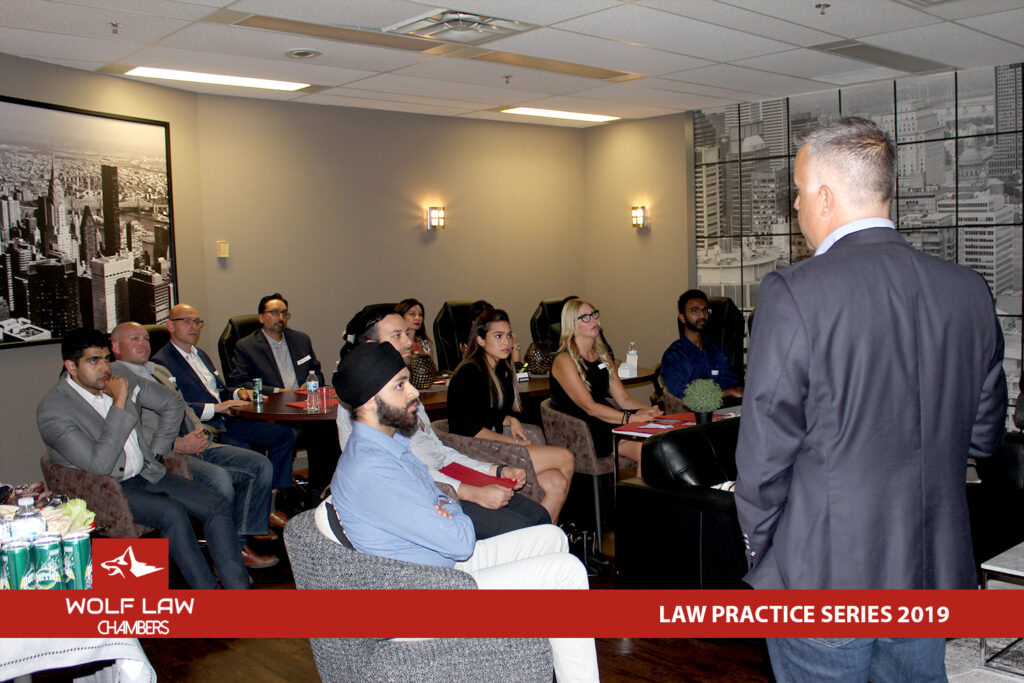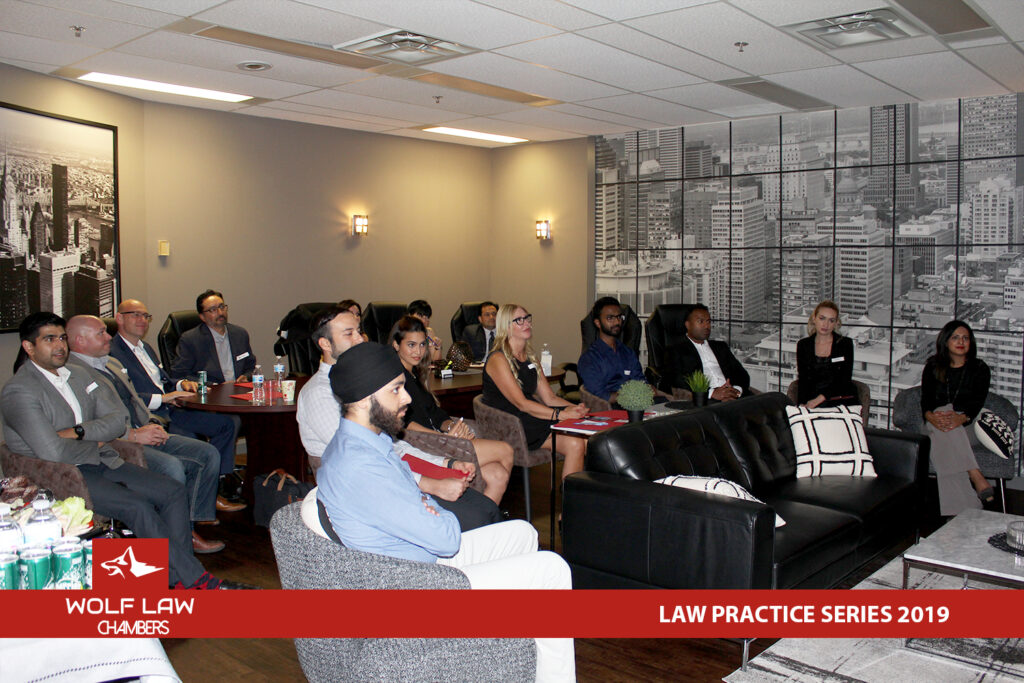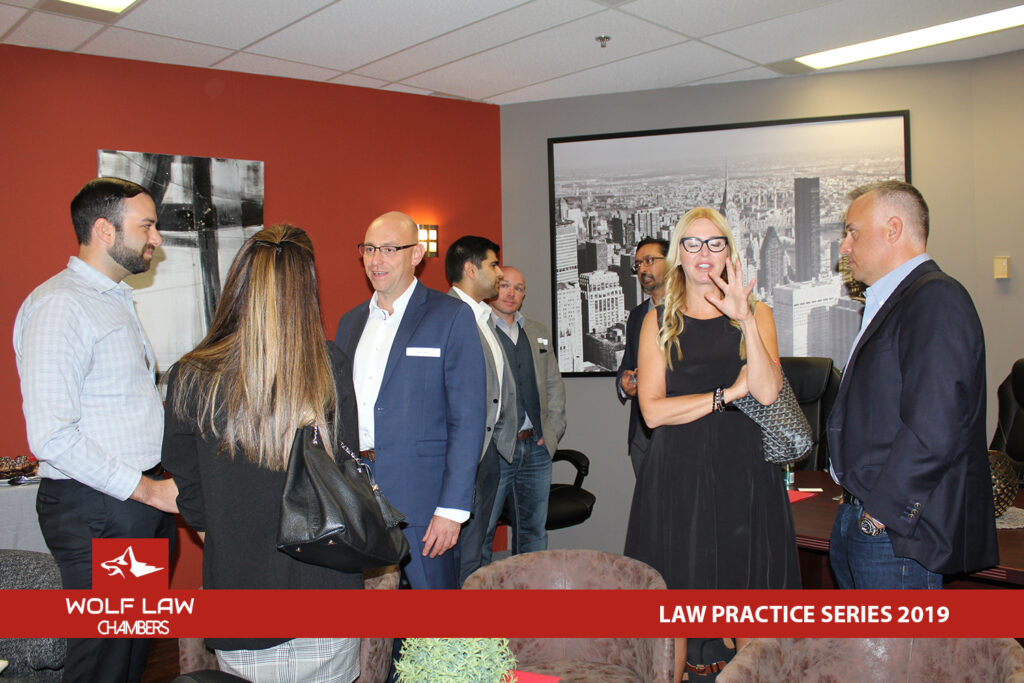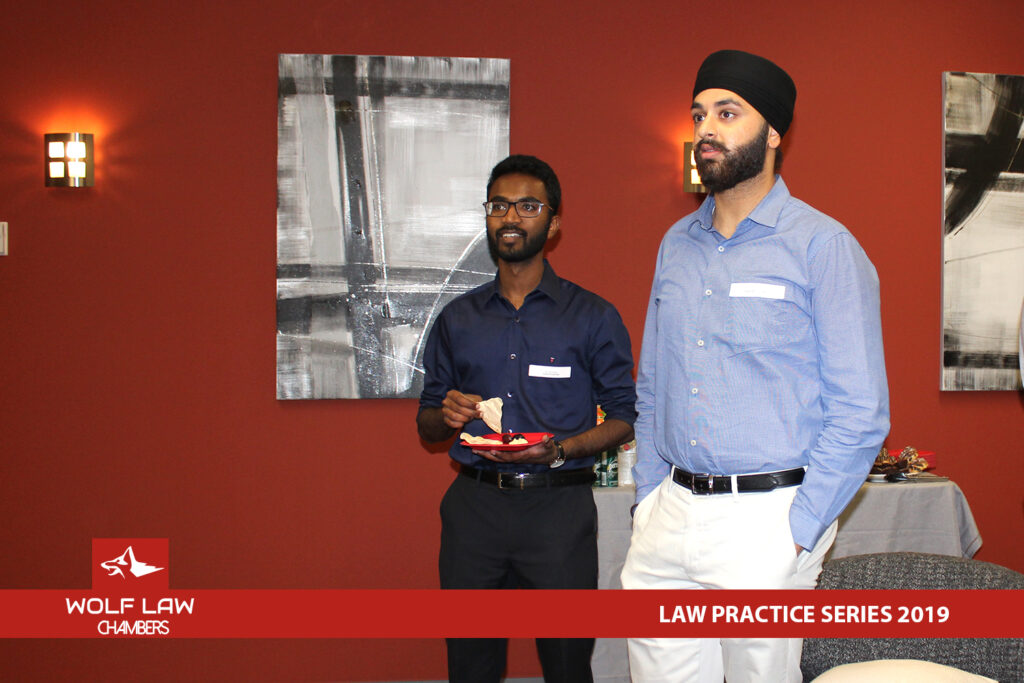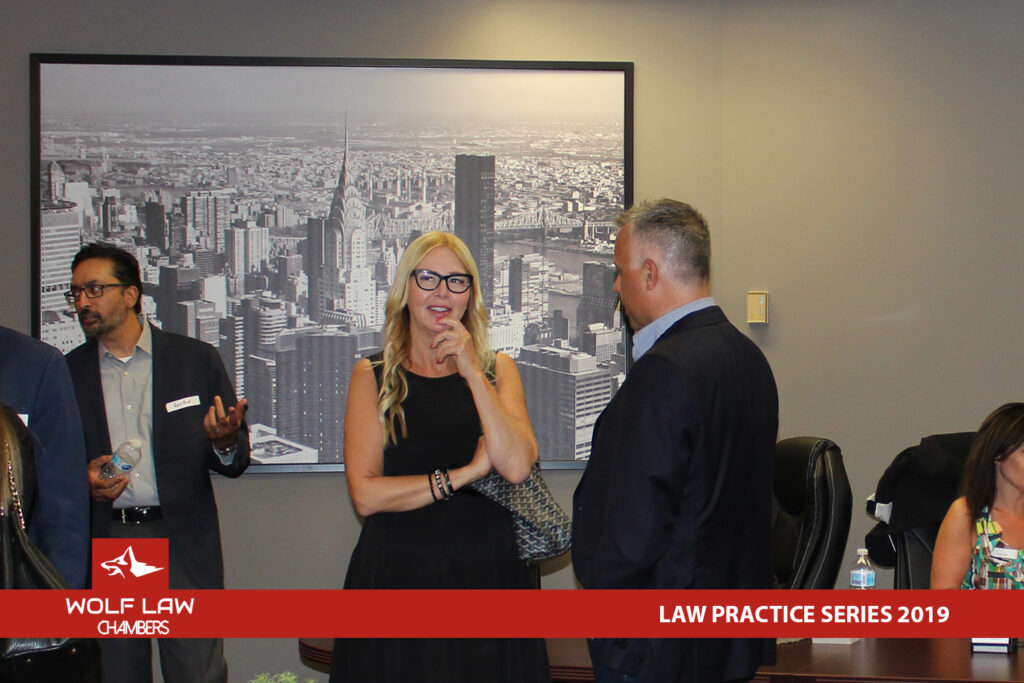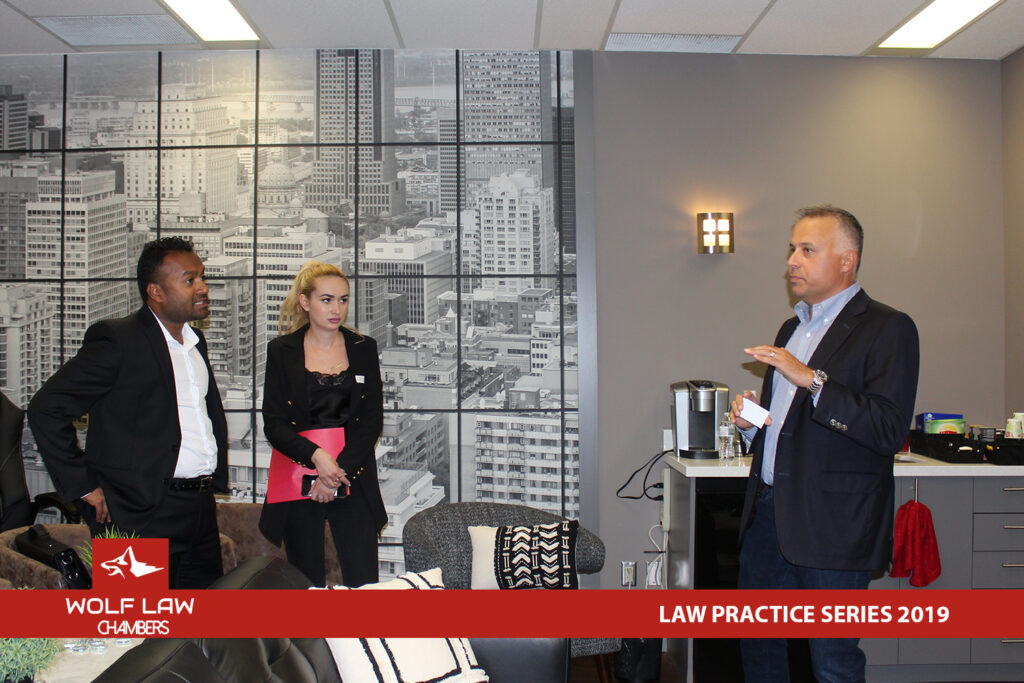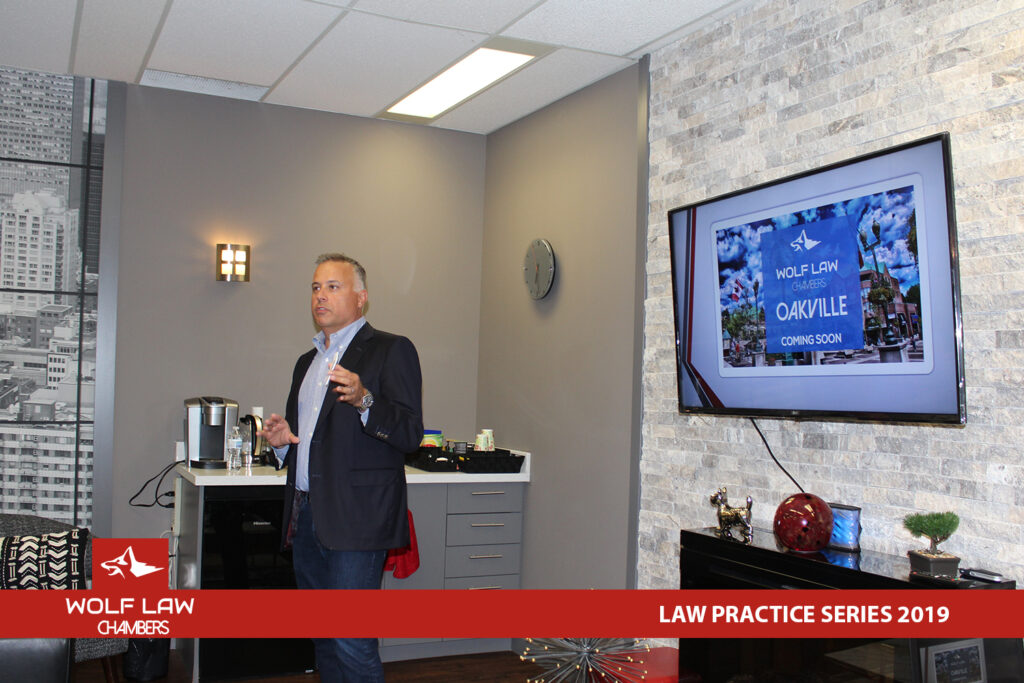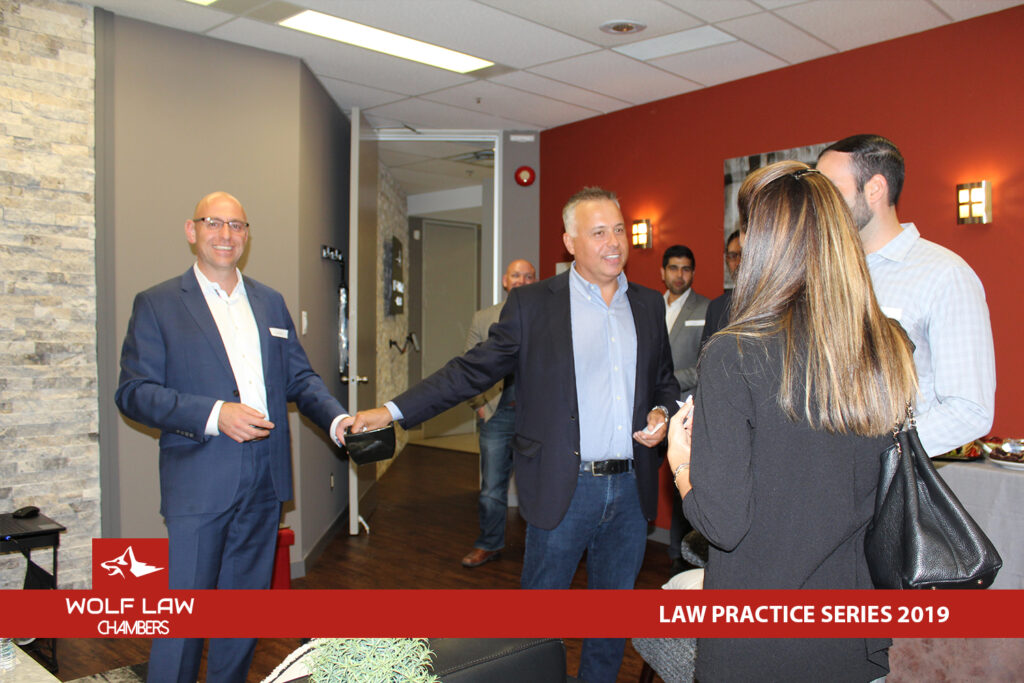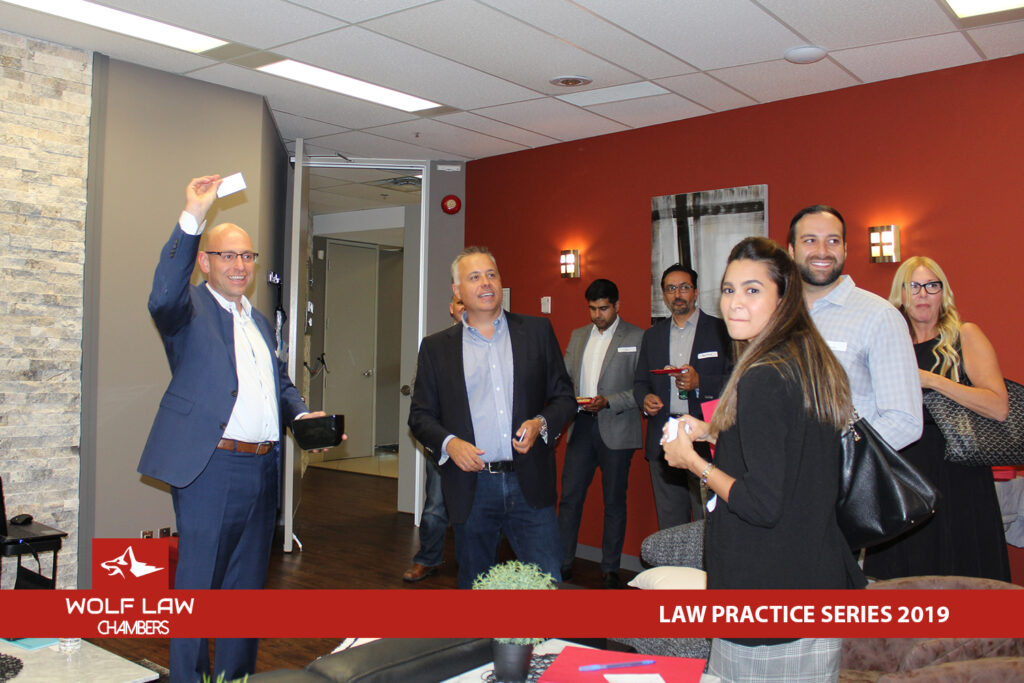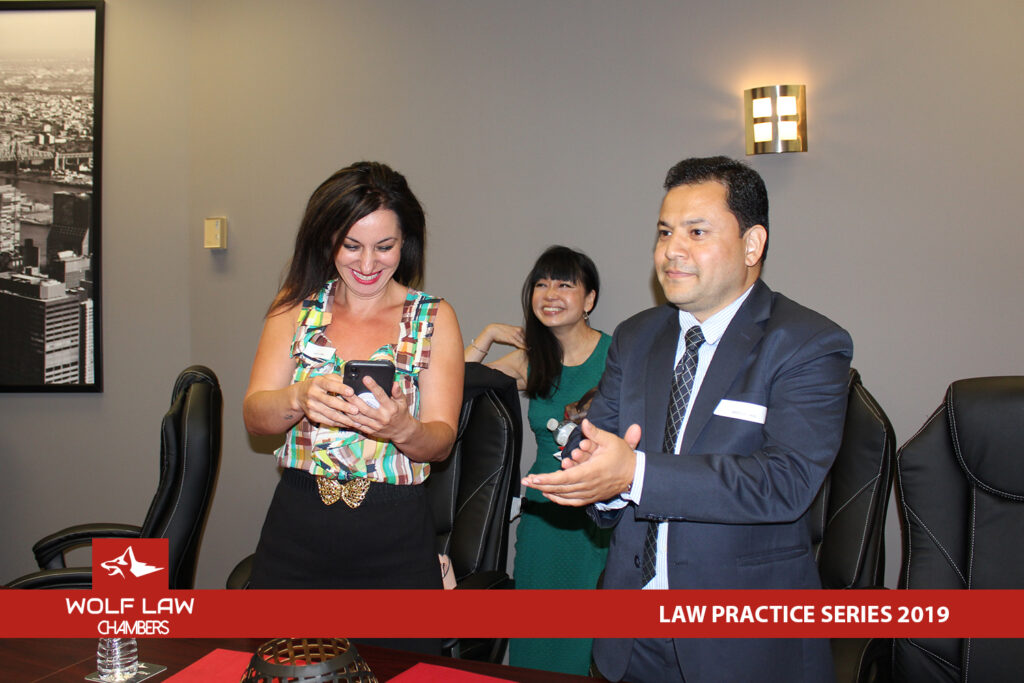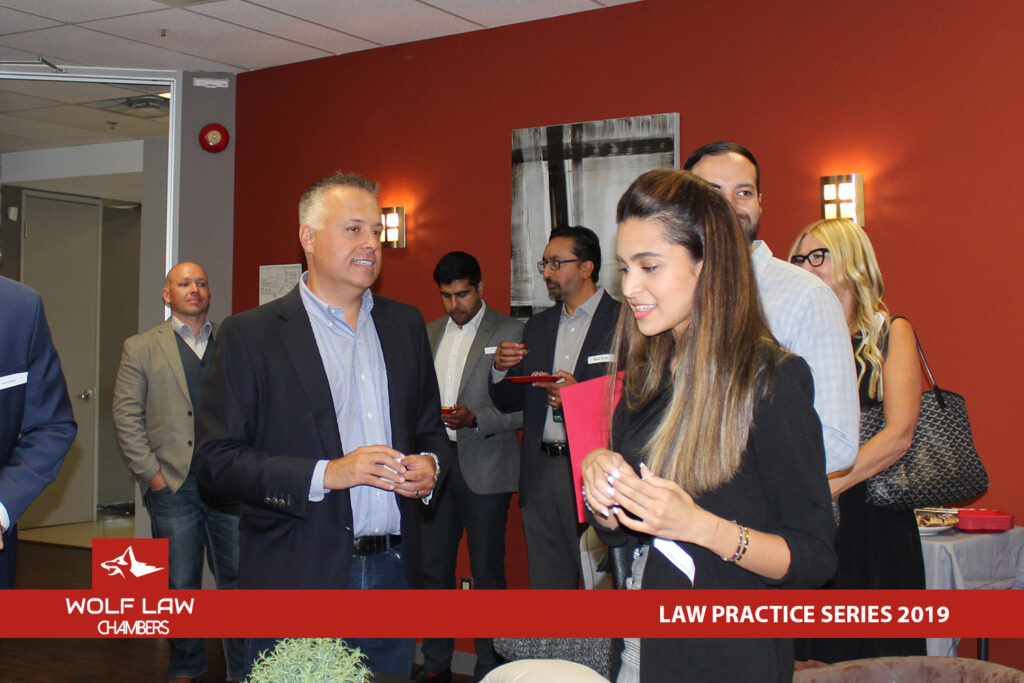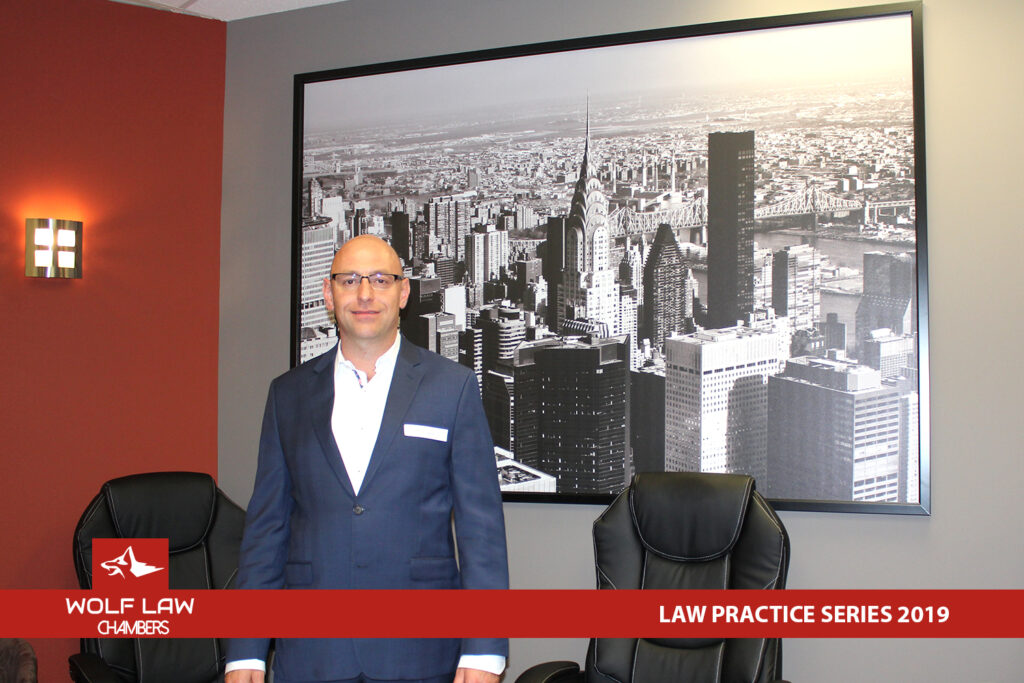LAWYERS
Counsel in Focus: Sodaba Rameh
Sodaba knew she wanted to be a lawyer from a young age. It didn’t matter what area of law because everything was rooted in law. No matter the focus, no matter the field, no matter the specialty, Sodaba would be a lawyer and help people. As she progressed in her education, Sodaba reviewed her choices and chose to specialize in immigration law. She covers everything from refugee matters, to economy class (people who want to work, study or visit in Canada) to business class (people who want to start businesses here or transfer their business from another country).
Law is one of those fields that touches every aspect of life – whether it is immigration, business, or criminal; everything we do is somehow rooted in law.
– Sodaba Rameh of Rameh Law
Background
Sodaba went to law school in Canterbury, England at the University of Kent. She chose an overseas school because she wanted an international experience. It exposed her to the judicial systems of other countries: what they focus on and how they operate. She traveled to France and Belgium to work with refugee camps, and she also worked on legal projects in Gaza, Palestine. Returning to Canada, Sodaba completed a Masters of Law specializing in Canadian common law, in order to gain a Canadian law experience.
Before choosing immigration, Sodaba worked at a criminal law firm. There’s a lot of criticism around defending criminals, but it was a valuable experience for her. “What that area of law taught me was that no matter who [you] are or what situation you are in, you need representation,” she says. She brings that mentality to immigration as well. Everyone deserves representation and everyone deserves to have a judgment that’s fair and free of mistakes.
While she was in school, she had the opportunity to join Amnesty International and be part of the teams that visited the refugee camps during the Refugee Crisis of 2015. They did their best to provide financial and medical aid but too often it felt insufficient considering all that the people had gone through, fleeing their homes and being separated from their loved ones. Sodaba spent many hours talking to them, hearing their stories, sharing their pain and their hope for the future. It became personal. It intensified the desire to help, to do something that will brighten someone’s day, change someone’s life. Her time with them left a deep and lasting impression.
Her involvement with Gaza, Palestine was through a partnership between her school and Legal Aid in Palestine. The objective was to find a way to follow the Palestinian laws while empowering women and giving them a voice all within the boundaries of the law. They focused on women and the struggles they were facing. It required becoming familiar with Palestinian culture and its legal framework. This was an invaluable experience and provided insight into a legal system completely unlike that of Britain or Canada.
Any type of immigration work you do will impact someone’s life directly. That’s what she loves about the law and immigration as well as what challenges her about it. She is delighted when her clients can stay in Canada aided by her efforts. “It’s very rewarding, helping a family gain the life in Canada that my family was able to get,” she says. Sodaba relishes each one as an opportunity to grow and to wrestle with the law, to see it in a different perspective until the desired end result is achieved. Not unlike her time spent at the refugee camps.
Choosing Wolf Law Chambers
Through LinkedIn, Sodaba found Wolf Law Chambers and the CPD they were hosting: “Surviving Your First Audit.” After the seminar, Sodaba joined a group getting a tour of the offices at Wolf Law Chambers, and had a chat with Dezso Farkas, the Director. “I really got his vision as to what he’s doing and I really appreciate what he’s trying do for the legal community,” she said. When the principal lawyer at the criminal law firm Sodaba worked at was called to the bench, Sodaba decided to branch out and start her own practice. She knew that Wolf Law Chambers would be a place she could flourish because there would be other people around that were business-minded as well as legally focused. Wolf Law Chambers was a perfect match because there was a built-in community, a place where she could foster relationships and collaborate with other legal professionals, receiving advice and help as well as giving her own expertise in return.
She’s especially grateful for the different services that Wolf Law Chambers offers. On her own, she had to oversee every aspect of her business. Now, she really appreciates that she can trust someone else to arrange for her packages to be sent out giving her more time to focus on her clients. “What I appreciate about Wolf Law Chambers, I don’t have to worry about the administrative side. They cake care of the major aspects,” she says.
The cornerstone of Sodaba’s life is the relationships she develops and cultivates with the people around her. They excite her, motivate her and drive her to make a difference in their lives. She’s very passionate about all her clients getting the justice they deserve. She wants to make sure that regardless of right or wrong, regardless of how many times they’ve tried, they are represented. By taking care of her client’s legal needs and advocating for their rights through what can be a complicated process, she hopes to lessen the burden and enable her clients to focus on building a life here in Canada.
If you are facing difficulties with your immigration application, give Sodaba Rameh a call. She is here to take care of your legal needs so that you can live your life.
Presentation Skills for Lawyers – Webinar Event
We would like to give a huge thank you to Max Beaumont from Potato Chip Communications for adjusting his presentation “Presentation Skills for Lawyers” to fit an online medium. Although we were not able to participate in some of the interactive exercises that were originally planned before COVID-19 arrived and online meetings became the norm, Max still made the session fun, interactive and memorable.
Everyone has experienced the nervousness that comes with giving public presentations, perhaps reminding us of that first middle school presentation that felt like a flop! Max understands this nervousness and outlines six major things to focus on to improve our presentation skills: mindset, body language, audience interaction, conversational delivery, and simple messages.
The biggest takeaway was mindset and audience interaction.

Our natural bent when explaining our presentation before our peers or others is to focus on ourselves: not messing up, slowing down our speech, getting sales, how we’re coming across. Bottom line? We’re thinking about ‘me’. Max challenged us to change our mindset, shifting it from the mechanics we’re engaging in to get our message across, to instead think about our audience, to listen to ourselves as if we were sitting in their shoes. In addition, he let us in on the ‘secret sauce,’ the key ingredient to channeling our nervousness into a presentation that achieves a conversational style and engages our audience in an accessible way. By the end, we all left the meeting with something to think about.
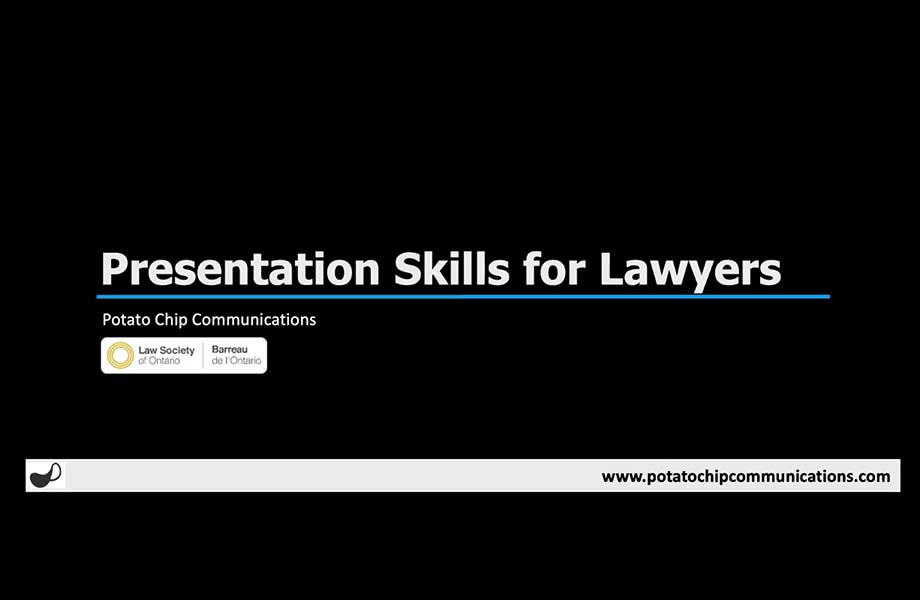
This is one of the benefits of being a member of Wolf Law Chambers, that from time to time we come together as a community of professionals to participate in ongoing educational seminars that are also open to friends of Wolf Law Chambers. And of course, the credits gained by attending count towards a legal practitioners’ annual requirement for continuing education.
We invite you to join us for our next seminar. Who knows? Maybe Max will be back.
Determination and Perseverance Always: Gideon McMaster
Gideon McMaster of McMaster Law practices in the areas of criminal defense, civil litigation and commercial law. He was admitted to the bar in Trinidad and Tobago in 2012 and upon moving to Canada in 2017, started the accreditation process to be a licensed legal professional. Gideon has now been a Foreign Legal Consultant in Ontario since May 2017. He currently maintains his practice in Trinidad & Tobago, separate from his practice here in Ontario, which is new and growing quickly.
Gideon is grateful for the experience he gained in Trinidad and Tobago that shaped him into the lawyer he is today and where he has been involved in numerous high-profile cases. He values being licensed to practice both there and in Ontario and believes that both jurisdictions continue to develop him as a lawyer in their own unique ways. Gideon is inspired by top litigators who win difficult cases, especially those in which it seemed all hope had been lost.
The Choice to Become a Lawyer
Gideon’s choice to become a lawyer gradually formed from several factors. Since childhood Gideon has been outspoken, independently minded and passionate about the things in which he believes. Gideon’s interest in law as a career path developed through his association with persons involved in law and politics during his adolescence, including close friends of his family. His home is well known by relatives as a battleground for political debates. Gideon viewed the legal profession as a viable avenue through which he could generate positive changes in his environment. On the business side of things, he saw his parents build a very successful business from the ground up. Watching them, Gideon recognized that all success and failure would come through his own grit and determination. He understood that these qualities would also bring fulfillment in his life’s work.
Philosophy
Gideon sees his philosophy of life as consistently working towards being an agent of positive change in any environment he is in. He believes that determination, grit and a burning desire to succeed even when the odds are against you are the hallmarks of most successful individuals irrespective of profession. That’s the kind of lawyer Gideon desires to be.
The Mark of a Good Lawyer
Litigating is a superb career choice for people who like to argue, and Gideon thrives on arguing! While this might lead to difficulty in other professions, it is an excellent asset for litigators. It is the job of the litigator to argue for his client’s rights and it is one of Gideon’s goals to become a top litigator in the province. Litigating is not about winning – even though a love of arguing implies a love of winning. While Gideon loves competition, it is simply not the most important thing to him. He commented that winning is simply expected of lawyers, a by-product of their true purpose to fulfill their civic duty.
He freely admits that while winning has its benefits, he feels that making litigation about winning is not a true test of a lawyer’s skill or aptitude since there are many factors that may skew the results and make them look positive: choosing only “winnable” cases, getting a sympathetic judge, or having at one’s disposal considerably more favourable evidence. Because of these factors, Gideon believes that what makes a good lawyer is skill, not necessarily the lawyer’s record of wins.
To him, being a top litigator is more about honing his skill and doing the job with excellence and perseverance. It is about helping the people who come to him with the very best of his ability – this is Gideon’s passion.
Gideon describes a good lawyer as a person who:
- Understands the importance of the client and their obligation to them,
- Understands that in many instances people come to lawyers at the worst points in their lives, and,
- Shows compassion to those seeking out their services. Of course, every lawyer needs to have paying clients in order to make a living but Gideon believes there are times that a lawyer may need to take on a case pro bono, and he has personally found much fulfillment in doing so.
He has been fortunate to have won the vast majority of his cases, but he refuses to put a number to his win ratio. He attributes it to good trials and good luck together. Instead Gideon prefers to focus on his passion to help people who are in need of a skilled litigator.
Choosing Wolf Law Chambers
Gideon is excited to be a part of Wolf Law Chambers and the benefits it brings to his practice. Since he doesn’t need to worry about administrative details such as internet, phone bills or going to the post office – it’s all taken care of in-house – this allows much more time to be focused on his case load. Gideon chose Wolf Law Chambers because of its structural similarity to the law chambers model which exists in Britain and the Caribbean, where he was trained. He also practices in a law chambers in Trinidad & Tobago. Gideon is attracted to the idea of lawyers working in close proximity to one another as it fosters an environment in which lawyers can bounce ideas off one other, work collaboratively, have an intellectual exchange, and have the opportunity to learn and help one another.
Gideon is a very determined, goal-oriented lawyer. His belief that there is always room for growth inspires him to continue striving for excellence as he builds up his practice in Ontario and continues to hone his advocacy skills. His love of arguing and his sincere desire to help his client get everything they deserve make him a valuable addition to Wolf Law Chambers. Gideon never gives up… just like his favourite soccer team.
Gideon is an avid supporter of Manchester United. Attending Law School in Manchester, UK, gave Gideon plenty of time to observe the team’s story and philosophy of sheer determination and doggedness; to see them as a team that never says ‘die’ and fights to the bitter end. He believes that this is consistent with his own outlook and philosophy of life. Gideon is also an amateur soccer player and plays in the Burlington Soccer League with Squire FC.
If you have any legal matters pertaining to criminal defense, civil litigation or commercial law, feel free to contact Gideon for a consultation.
Cyber Security with Humzah Khaial
Cyber Security has been the most requested seminar after How to Survive an Audit (which took place in the spring of 2019). Humzah Khaial kindly gave a seminar on the tactics used by hackers and preventative measures against their attacks to the group gathered at our Oakville location on December 5, 2019.
Even though it can be a scary topic, it is important to educate ourselves not only about ways to prevent attacks but also how hackers try to infiltrate our systems. If we know their methods, it’s easier to recognize their tactics.
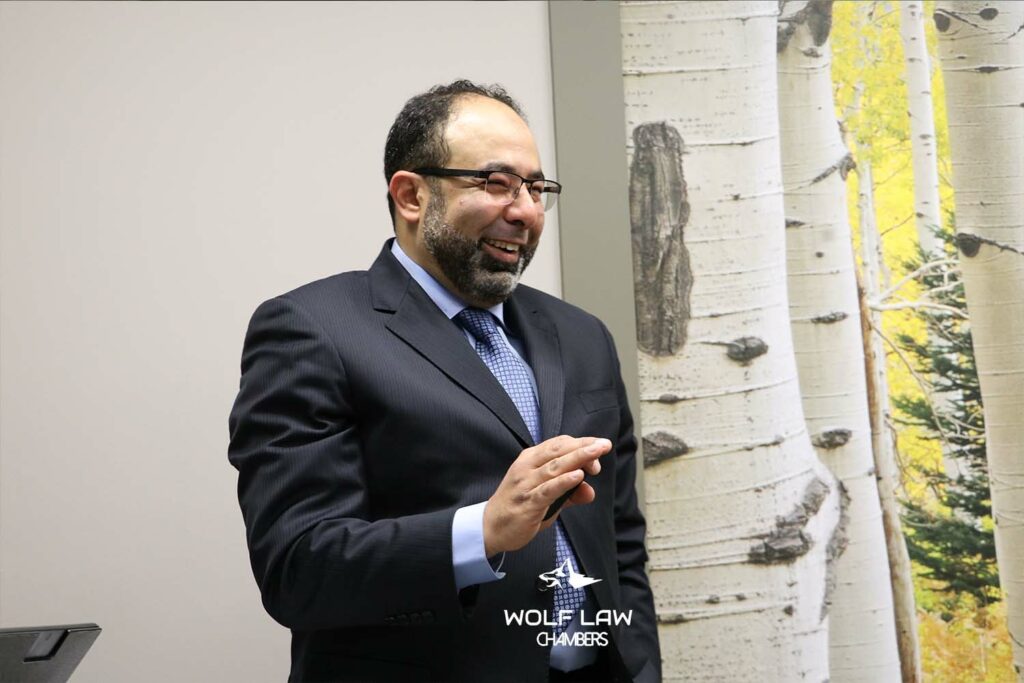
One of the main targets for hackers is small businesses because they’re lucrative. They have money and sensitive information, but they’re small, so they don’t have a dedicated security department, making them easier to hack into.
What to look for
Attachments in emails can look legitimate. But if after clicking on the attachment, it asks you to change something to your system, don’t. If you do, it gives access to the hacker.
How do you know the email is fake? Hover over the “From” address. Microsoft Office and Outlook 365 now give you the full address when you hover. This is to help you identify senders. If you don’t recognize the sender, don’t click.
Another technique hackers use is grammar and spelling mistakes. They want to filter out anyone who is paying attention. They want victims who aren’t paying attention because those people may not remember what exactly they clicked on or allowed onto their computer.
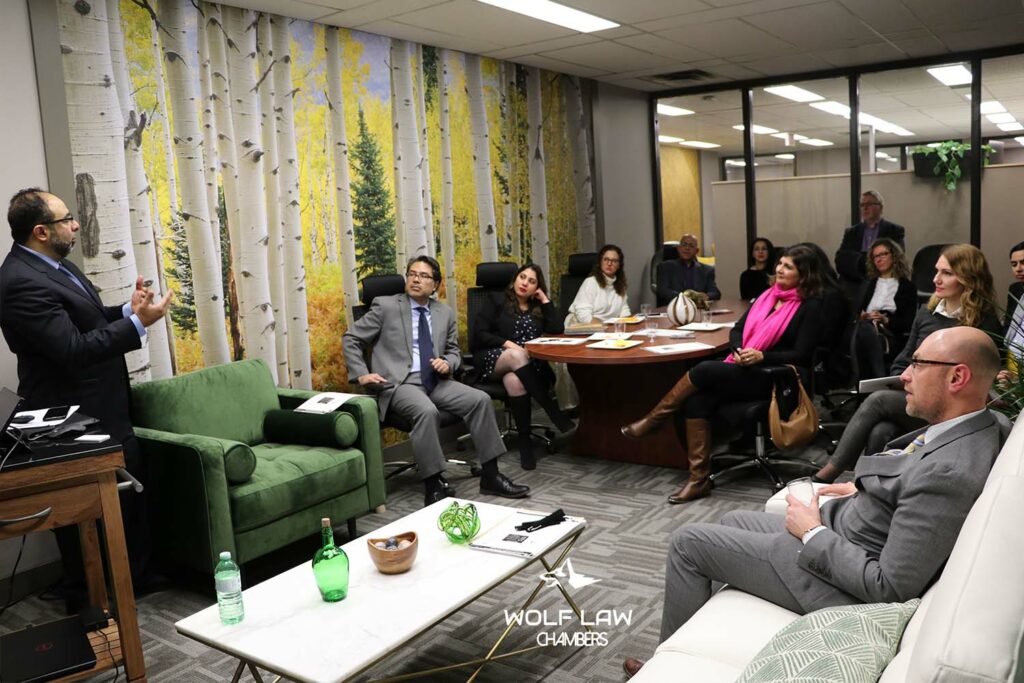
If the email contains an image of text instead of just plain text, this could be hackers trying to get around your detection software. Software can read text easily, but it cannot read images.
Prevention
The best way is a combination defence. Use as many methods as possible to foil hackers.
When on a public network, use a VPN, a Virtual Private Network. It acts as a tunnel between your device and the public network, preventing any would-be hackers from easily accessing your device and any passwords you may enter while on that public network.
Constantly back up your work. This will protect your information no matter what happens.
Don’t use the same password for everything and use a combination of symbols, letters and numbers. Try not to put passwords on sticky notes. They can get lost easily.
Use two-factor authentication. It’s a password and a code sent to your phone, extra security to verify it is you who is accessing the account.
Update all operating systems on a regular basis.
Employees are your first line of defence. It’s important to train them in security awareness and prevention.
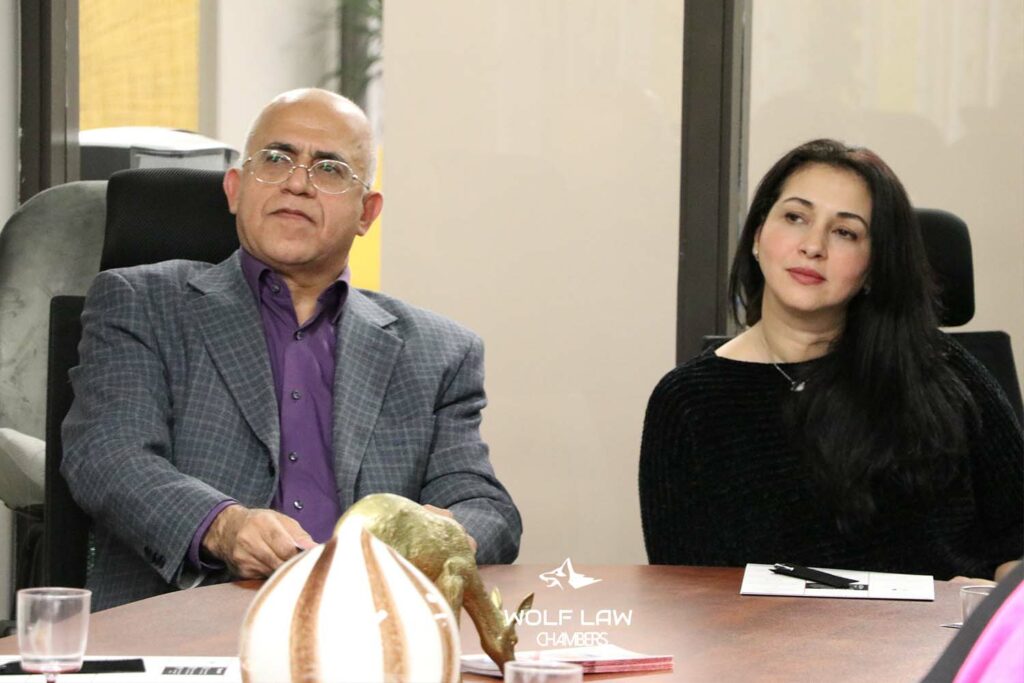
Risk Management
Going forward, we need to: prevent, protect, educate. It’s a continuous and changing process. The technological landscape is constantly changing and we need to keep up to date with it.
As the head of your business, you set the tone for your organization. Preventive, protective and educational measures starts at the top. It starts with you.
At Wolf Law Chambers we strive to host seminars that are relevant to the challenges legal practitioners are facing today. Let us know if there is a topic or challenge you want to learn more about.
Best Interests of the Child: An Intersectionality Between Family and Immigration Law
Article 3.1 of the United Nations Human Rights (UNHR) Convention on the Rights of the Child (CRC) states the following:
In all actions concerning children, whether undertaken by public or private social welfare institutions, courts of law, administrative authorities or legislative bodies, the best interests of the child shall be a primary consideration [1].
The Convention on the Rights of the Child is the most widely ratified treaty in human history with 194 countries abiding by it [2]. It is internationally observed and accepted, while it’s application and practice is a topic for another day. In understanding who is protected under the CRC, we must define what it means to be a child.

According to the United Nations a child is,
…every human being below the age of eighteen years unless under the law applicable to the child, majority is attained earlier [1].
Now, it is quite important to asses the relevance of these international statutes in relation to Human Rights within Canada. To put into perspective the importance of human rights in Canada, we must understand that human rights are protected federally and provincially. The human rights laws in Canada stem from the Universal Declaration of Human Rights (UDHR). In fact, Canadian lawyer and scholar, John Humphrey, played an integral role in the drafting of the UDHR in 1948 as well [3]. Globally, many countries have applied the declaration and its contents to bolster their own national legislations and to act in accordance with the statutes outlined within international human rights laws. In Canada, human rights are entrenched in the Constitution of this very nation, most notably in the Canadian Charter of Rights and Freedoms but they have an overlapping relevance in other areas of law as well. Family and immigration law within Canada places great importance on the best interests of the child, drawing from the Convention on the Rights of the Child. This principal governs decisions and judgements within family and immigration matters, that of which involve children [4]. It is truly a point of intersection across both fields of law and legislation.
The Canadian Bar Association brilliantly outlines the best interests of the child and the three fold concept that entails it.

They use the following general commentary from the Convention on the Rights of the Child to elaborate on their viewpoints about the best interests of the child:
A substantive right – a primary consideration in actions concerning the child due to the child’s dependency, maturity, legal status and often “voicelessness”;
An interpretive principle – if a legal provision is open to more than one interpretation, the interpretation which most effectively serves the child’s best interests should be chosen;
A rule of procedure – legal representation, timely decisions, reasons for how a decision was reached, how factors were weighed, and how the child’s views were considered. [4]

In other words, children have a legal entitlement that ensures those decisions which concern them are carried out with their best interests as a primary consideration. Next, for legislation that is open to interpretation, interpretations serving the best interest of the child should be chosen [4]. The final component involves procedural considerations for the best interests of the child. Whether it is substantively or procedurally, the best interests of the child are to be weighed and considered first and foremost. With this three-fold concept underlying the concepts and legislation set forth by the CRC, let’s examine how it has played an effective role in Canadian law.
In determining child access and custody in the province of Saskatchewan, section 8 of the Children’s Law Act outlines the necessary conditions to be met when making a decision about ordering custody of a child. Subsequently, they note considerations that are to be weighed in granting custody of the child as well. These include, but are not limited to, the capacity of the person seeking custody of the child, the child’s wishes, the quality of the relationship between the person seeking custody and the child themselves, the physiological, emotional, psychological, social, and economic needs of the child [5].
Additionally, section 24 of the Children’s Law Reform Act of Ontario determines the merits for application of custody or access for a child [6]. This statute places immense importance on the best interests of the child, with special consideration of the child’s needs and circumstances. Some of these needs and circumstances include the plan proposed by the person(s) applying for access of custody of the child, the child’s views and preferences, the stability of the family unit in which the child will potentially settle, to name a few [6]. The Revised Statutes of Ontario also outline the procedural practices in place by the court in issuing orders for the custody and access of a child [7].
Federally, the Divorce Act, examines the best interests of the child in carrying out orders for custody of a child [8].
Under section 16, subsection 8, it states,
In making an order under this section, the court shall take into consideration only the best interests of the child of the marriage as determined by reference to the condition, means, needs and other circumstances of the child [8].

It is quite apparent that federally and provincially the underlying principles governing child custody and access in family law clearly place a high degree of significance on the best interests of the child. The priority placed upon the needs and the circumstances of children is not just limited to the area of family law. It also constitutes the legislation surrounding immigration in Canada involving children. In exploring the application of the best interests of the child within Canadian immigration law, let’s take a look at the Immigration and Refugee Protection Act. Pursuant to the act, those normally not able to seek permanent residency in Canada, are able to apply under humanitarian and compassionate grounds in special circumstances [9]. The humanitarian and compassionate grounds assessment weighs the best interests of the child highly and its jurisdiction is within Canada and overseas [9]. Generally, the child’s physical, emotional, social, and cultural welfare are factored in when assessing a humanitarian and compassionate grounds application [9]. The factors considered include, the level of dependency between the child and the H&C applicant, the child’s link to the country in relation to which the application is considered, the impact of returning to their home country, the medical needs of the child, the impact on the child’s education and growth, etc. [9]

Immigration can involve the detainment and release of individuals depending on the context of their specific case.
Under Division 6, section 60 of the Immigration and Refugee Protection Act, states the following:
For the purposes of this Division, it is affirmed as a principle that a minor child shall be detained only as a measure of last resort, taking into account the other applicable grounds and criteria including the best interests of the child [10].
The Immigration Appeal Division does not overlook the importance that is to be placed upon the safety and best interests of the child. It is affirmatively understood from this statute that detaining a minor is the absolute last resort and does not serve in the best interest of the child [10].
Moreover, the right to appeal immigration decisions under the Immigration Appeal Division has procedural laws in place that administer how the government will proceed in detention and release of immigrants/refugees [10].
Section 68, subsection 1, states the following in regard to a removal order being stayed:
To stay a removal order, the Immigration Appeal Division must be satisfied, taking into account the best interests of a child directly affected by the decision, that sufficient humanitarian and compassionate considerations warrant special relief in light of all the circumstances of the case [10].
In the case of a removal order being stayed, the best interest of the child is again given the utmost priority if a child is directly involved. The statute aims to heavily consider humanitarian and compassionate grounds when ordering a stay for a child [10]. This leads one to believe that Immigration Canada carefully formulates a decision oriented in the best interests of the child.

A famous Canadian immigration case based upon H&C grounds is that of Baker v. Canada. An illegal immigrant in Canada for 11 years at the time, on the verge of being deported, filed an application for permanent residency [11]. Her application was rejected and when she filed with the Federal Court, they deemed that it was not necessary to evaluate her application in light of the best interests of her children. On appeal, the Supreme Court of Canada reversed this decision. They held that the human rights of Baker’s children should be considered and that decision makers of this case should abide by the values in international human rights law, specifically the Convention on the Rights of the Child [11]. Overall, it was established that an immigration decision made on H&C grounds would be arbitrary if an analysis of the best interests of the child was not implemented [11].
Closing thoughts
Stemming from international human rights law, the best interest of the child is a principle vested in Canadian family and immigration law involving children. It is undeniably an overlap between the two areas of law and the general guidelines are quite the same. In all actions concerning children, the primary consideration is the best interest of the child. In Canada, both federally and provincially, substantive and procedural law illustrate how the best interest of the child is a fundamental standard in decision making for family and immigration matters regarding children.
[1] Convention on the Rights of the Child, 2 November 1989, UNTS, Part I, Article 1(3) (entered into force 2 September 1990)[2] Human Rights Watch, “25th Anniversary of the Convention on the Rights of the Child” (17 November 2014), online (blog): Human Rights Watch <https://www.hrw.org/news/2014/11/17/25th-anniversary-convention-rights-child>
[3] Canada, Canadian human rights commission, Human Rights in Canada, < https://www.chrc-ccdp.gc.ca/eng/content/human-rights-in-canada> accessed 12 September 2019. [4] The Canadian Bar Association, BEST INTERESTS OF THE CHILD, http://www.cba.org/Publications-Resources/Practice-Tools/Child-Rights-Toolkit/theChild/Best-Interests-of-the-Child accessed 12 September 2019. [5] s. 8, Children’s Law Act, 1997, S.S. 1997, c. C-8.2 [6] s. 24, Children’s Law Reform Act, S.S. 1990, C-2 [7] s. 28, Children’s Law Reform Act, S.S. 1990, C-1 [8] Divorce Act, R.S.C., 1985, c. 3 (2nd Supp.), ss. 16(8), 17 [9] S.C. 2001, c. 27 – ss. 25(1), 25.1, 28(2)(c) [10] S.C. 2001, s. 60, 67(1)(c), 68(1) [11] [1999] 2 S.C.R. 817Reinventing the legal framework
Dezso Farkas
The significance of a man’s prestige is a collective reflection of all his attributes. Dezso Farkas is a man of many attributes. Apart from being a law practitioner and an entrepreneur who helps start-ups, Dezso is responsible for the conception of Wolf Law Chambers. The chambers, described as a multi-disciplinary law practice, is an innovative approach to providing a workplace where legal professionals can seek support and resources, while maintaining their status as a singular entity.
Educational Background
Dezso graduated with a BA Honours degree from York University and then went on to earn his Master of Laws (LLM) degree (specializing in Corporate Governance) and a Juris Doctor (JD) degree, both from Osgoode Hall Law School, York University. Soon after he was called to the Bar and currently, he is licensed to practice as a Barrister & Solicitor in the Province of Ontario.
Apart from periodically visiting the courthouse, Dezso made time to publish several articles in the prestigious Delaware Journal of Corporate Law, Transnational Legal Theory Journal and the London Review of International Law. On a certain occasion Dezso also served with the Institute for Global Law and Policy at Harvard Law with his expertise on the legal side.
Professional Ventures
The scope of Dezso’s abilities is not just limited to law. On top of being a real-estate entrepreneur with considerable experience in the field, in the past Dezso has also acted as a director of the Reliant Gold Corp., a publicly traded junior mineral resources company.

Farkas Law “Business Lawyers”, the independent law firm chaired by Dezso Farkas, caters to the needs of small and medium-sized business clients. The self-description of the firm is stated as a body of “Business Lawyer” with an aim to provide customized legal services, guidance and trusted advice for business ventures of all kinds. Currently the clientele of Farkas Law includes start-ups, commercial landlords, real-estate developers, manufacturing companies, non-profit organisations and small business owners. The firm acts as an external “in-house” corporate counsel to save their valuable resources and focusing them towards successful outcomes.
Dezso’s substantial history of merit is a result of his personal ideology which can be better expressed by himself:
I believe in continuous professional growth and I am committed to gaining new knowledge and experience to better serve the needs of my clients.
Dezso Farkas
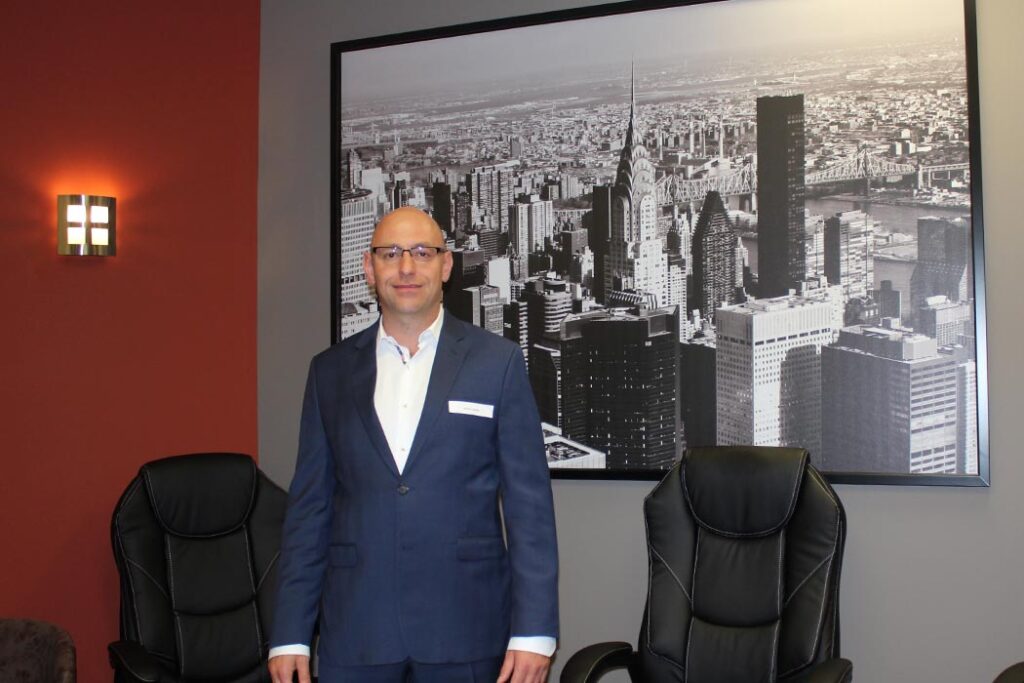
Vision
Ideally lawyers are intended to be a means of resolving problems for their clients. Sadly, not all lawyers are attuned to the needs of their clients. For Dezso Farkas, the motivation to become a lawyer came from his own unsavory past experience. As a young entrepreneur, Deszo encountered some obstacles and to resolve them he obviously pursued legal assistance; unfortunately, he got saddled with a ‘disengaged’ lawyer. At this point Dezso realized how detached lawyers are to the ideology of young entrepreneurs. Back then, if he had been a lawyer, he definitely could have handled his case more efficiently, he realized that going into law practice could be a real opportunity for him to help people.
Young entrepreneurs have no idea of the trouble they might get into when they are starting out. Its not possible for them to know everything about the line of commerce they are about to enter on their own. The consequences of their natural ignorance can sometimes be dire. Consequently, it is more complicated to undo a problematic situation than to avoid it in the first place.
Nevertheless, if an entrepreneur seeks the right advice from the very beginning, there’s no reason for them to get into trouble. According to Dezso, the biggest complaint he hears from his clients is that other lawyers don’t understand their clients’ businesses. Dezso on the other hand wants to understand his clients’ businesses and perspectives. He has a desire to leave people better than when they first came to him seeking a solution to their problems. In his own words, Dezso wants to be ‘Their Trusted Advisor’.
Wolf Law Chambers

Not all lawyers have the innate ability and the right personality to make it as sole practitioners. Lawyers who possess such qualities cannot work under others for long and can only thrive when they work for themselves. However, when these lawyers enter the domain of sole practice, they face a multitude of unique challenges they are not ready for. Support is non-existent as a result of their isolation and limited networking opportunities. The Law Society provides certain resources, to help solo firms stay compliant, but they have no avenue of providing any personalized advice in light of the ever-evolving business landscape to individual lawyers. In terms of modern-day workspace flexibility, the options for a lawyer on his own are very limited. Sometimes it becomes practically impossible for them to go out and search for law-based developmental resources to further their practice.
To Dezso the idea behind the creation of Wolf Law Chambers came as a solution to all the problems discussed above, which are being faced by lawyers. The services available at Wolf Law Chambers are uniquely targeted for law professionals, in order to allow them to grow personally in their sphere. The networking opportunities at Wolf Law Chambers are incredibly advantageous for sole practitioners. All the available resources, connections and events, allows lawyers to seek counsel from others in their profession, without any prejudice and with the purpose of benefiting each other. All of this is being carried out by lawyers at Wolf Law Chambers, while retaining their status as owners of their own law firms.
All lawyers should seek every opportunity they can to enhance their practice.
Dezso Farkas
Future
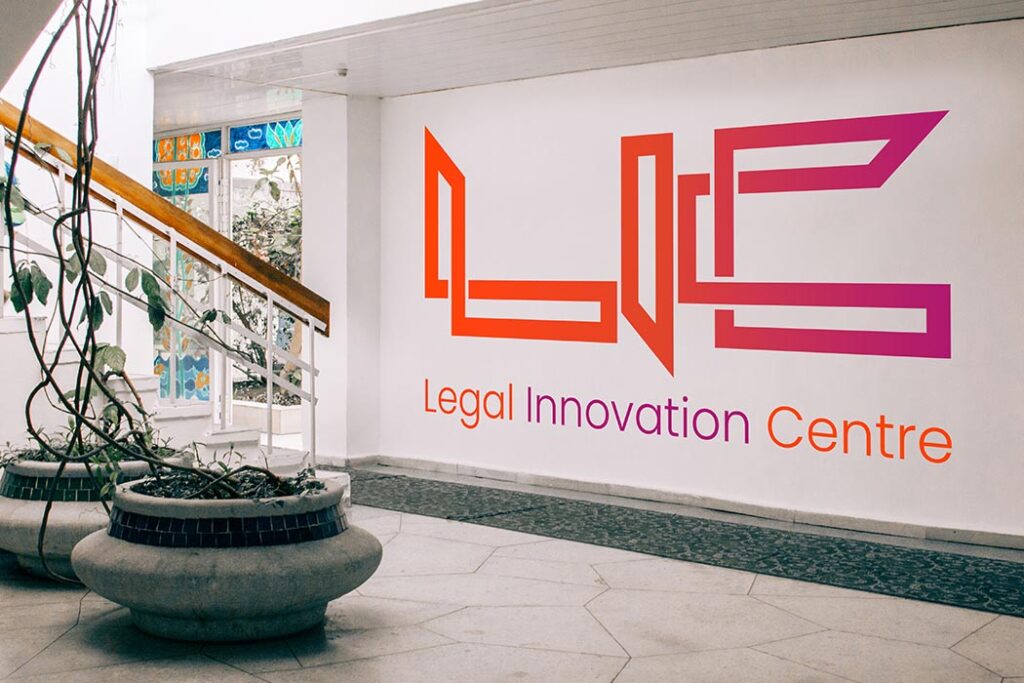
For Dezso Farkas, the future is just as promising as his present. He’s already planning to launch his upcoming project; the Legal Innovation Centre. Legal Innovation Centre will act as a ‘technology incubator’ to mentor start-ups in areas of legal research and development. According to Dezso, currently technology start-ups in the GTA West area are facing many challenges. There is a definite need for a facility like Legal Innovation Centre. The center will alleviate issues using their 3-step assistance plan; finding funding programs, providing a collaborative space and introducing start-ups to an already established network of industry experts. Legal Innovation Centre will focus resources on technological innovations which aim to shape the legal industry.
Are You Always Running Out of Time?
Are the current standards you have set in place the most efficient and viable in achieving your goals? Are you finding the right balance between your work and personal lives? Are you always pushing back deadlines and rescheduling matters? These are some of the questions you must ask yourself when assessing your legal practice. For lawyers, time is of the essence, no pun intended. They must prioritize their schedules in order to complete tasks on their daily agenda. There is always a constant influx of tasks and prioritization means everything when your most important assignment could be the next one you receive. Having the right skillset, tools, balance, flexibility, and procedures in place can simplify even the most complex matters allow lawyers to execute their plans proficiently. Such practices enable a firm to become more productive and this increased productivity is inevitably going to result in increased profits.
Let’s examine a billing trend report to determine how much billable time lawyers are actually getting out of their workday. Lawyers are working long hours to meet productivity goals but are only billing for 29% of their workday on average [1]. There is definitely a discrepancy in this figure and how occupied a typical lawyer’s schedule is. That means legal professionals are spending time carrying out tasks that do not equate to billable time. These tasks include, but are not limited to, administrative functions that are required in running your practice. Law school teaches lawyers how to carry out legal work and put their valuable legal expertise to practice. It is this knowledge and capability that allows lawyers to bill their clientele and earn an honest living. Yet, all law firms include tasks which need to be performed in order for a practice to remain functional but are not billable.

A simple business principle that can be implemented is outsourcing these tasks and leaving more time for yourself to work on assignments which can generate billable time. Bookkeeping and office administrative tasks can take up large portions of a workday but by outsourcing them to staff and paying for a particular service, more time is left for lawyers to focus on the legal matters specific to their line of work.
In realizing the proper techniques that need to be applied for running a more efficient legal practice, a quote from Mark Twain came up numerous times.
If you eat a frog first thing in the morning, the rest of your day will be wonderful.
Mark Twain [2]
and
If you have to eat a frog, don’t look at it for too long.
Mark Twain [2]

It is important to note that certain tasks can be daunting, and lawyers may push them back because they may take up most of their day. According to Twain, it is these tasks that could hold one back. Complete your most difficult assignment first thing in the morning, and suddenly, the other tasks become minute and less challenging. In doing so, you are able to prioritize your assignments, and create to-do lists for yourself in collaboration with your calendar [3].

Next, eliminating distractions will give you a sense of clarity in your work/practice. It is healthy to take breaks throughout your day and refresh but being unproductive is unjustifiable. Another healthy practice is taking care of your emotional and physical health. Being mentally and physically fit will contribute to your success just as much as your skillset and business intelligence will [4]. Being able to attract clients is not the sole determinate of success for a legal practice. It is equally important to be able to work on matters for those clients on a time efficient basis. If that includes taking a break, so be it. One should be open to the idea of stepping away from their work. Research shows that our brains are capable of solving problems while we are not actively working on them [5]. Hence, stepping away from your practice may, in fact, prove to be more beneficial than harmful.
Implementing technology may also prove to be an effective practice tool in time management. Using the most adept practice management software, communication tools, and digital services can lighten the burden on you and allow you to allocate time more freely. That simple advantage separates those attorneys who surrender focus on one aspect of their work and those who are all over the place.
A workspace committed to providing lawyers with the excellent communication tools and services to improve efficiency, is that of Wolf Law Chambers. Located in the heart of Mississauga, the chambers aids lawyers through the administrative aspects of their practice. This helps facilitate growth and expansion for the lawyers in their area of practice. Come in and see for yourself how Wolf Law Chambers is innovating time management in the practice of law. Visit us as 90 Matheson Blvd. West, Suite 101 and feel free to join us for all our upcoming events and workshops.

-Narvir Goindi
Networking Event – Legal Outsourcing vs. Hiring New Talent
Thank you to our fellow sole practitioners, the marvellous Peter Carayiannis from Conduit Law, and most welcomed guests for joining us on Thursday, August 15th, 2019 at Wolf Law Chambers. The topic of discussion for our event was the practicality that lies in outsourcing legal work in comparison to hiring new talent. Initially, sole practitioner, Dezso Farkas, of Farkas Legal Professional Corporation, spoke on the misconceptions in the legal field about outsourcing tasks to staff or legal clerks.
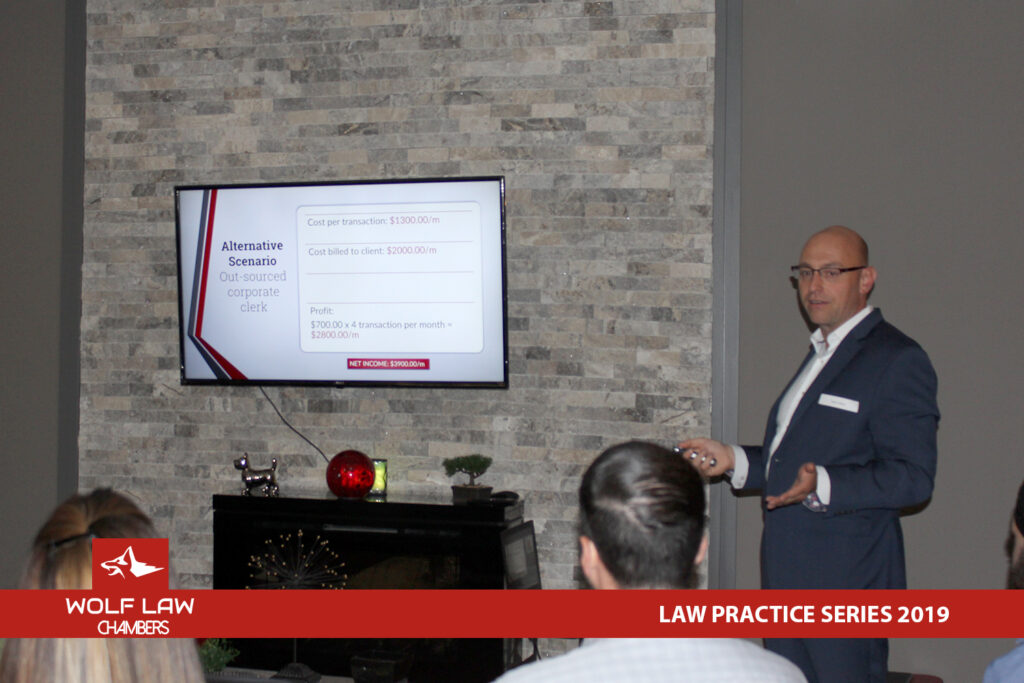
He explained how sole practitioners have a false perception that entails them carrying out every task that is part of the profession. Doing so, takes up a significant portion of their day and they are left with little to no time for billing clients. Mr. Farkas used accurate figures and analysis to depict how hours spent on practice management can be outsourced to staff and/or legal clerks to spend more time on actual legal work that can be billed. This leaves room to yield higher returns immediately, and is significantly compounded over longer durations of time. Legal outsourcing may seem like a discouraging practice as one has to shell money out of their pocket at first, but the time left to actually work on files and bill clients summons more profits for legal professionals.
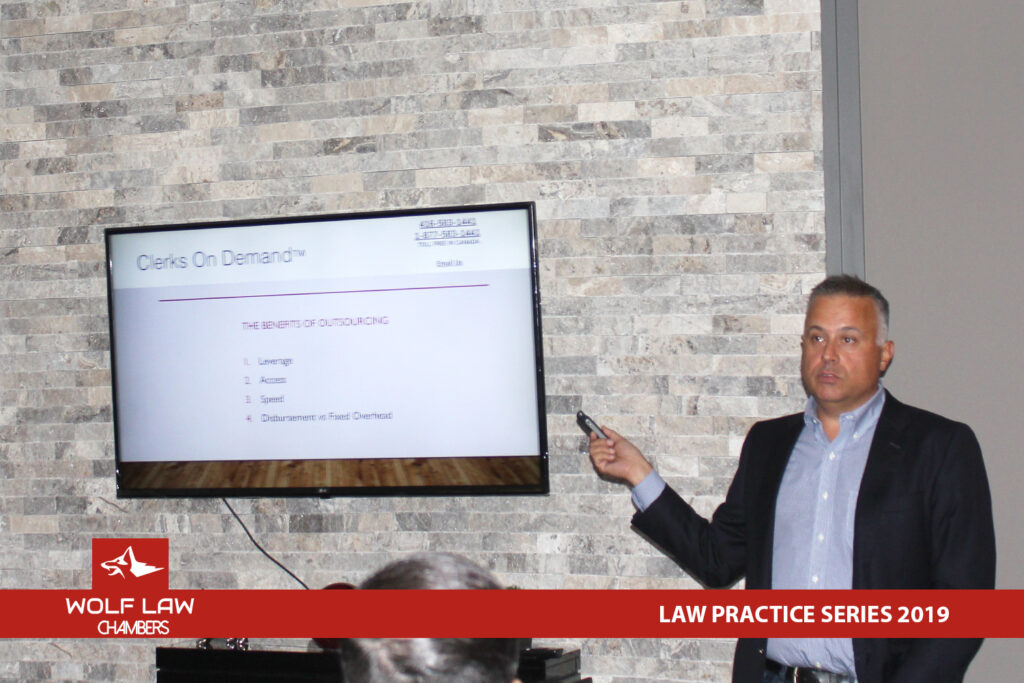
Peter Carayiannis from Conduit Law and Clerks on Demand outlined the many advantages legal outsourcing can have on one’s legal practice. He explained the differences between hiring new talent and outsourcing tasks to a company like Clerks on Demand. Essentially, hiring new talent thoroughly involves a recruitment process, training that has to be given, dealing with employee needs, and the constant thought of an employee leaving, leading to the whole process occurring again. Legal outsourcing, on the contrary, encompasses the passing of particular tasks to a professional and certified legal clerk, who is capable/experienced enough to complete assignments on their own. They can even be hired for a particular task or a specific period of time, allowing sole practitioners to leverage their time accordingly. Lawyers can then apply themselves to other facets of their practice, which in turn, allows for a yield of more returns. Peter brought up an interesting point during his presentation. He insisted that the audience understand the practicality behind outsourcing certain tasks of their legal practice. If a lawyer is not serving their client’s needs by performing a certain task, it should be outsourced to a legal clerk who can take care of it, while the lawyer works on more important matters, that serve the client’s legal needs directly.
Many of the sole practitioners present at the event saw the immediate benefits from outsourcing various areas of their practice to staff or legal clerks, and by doing so, being able to better focus and serve client needs. Some lawyers even noted the benefit in taking on more tasks than they would normally be able to handle by simply hiring clerks. Peter’s company, Clerks on Demand, allows lawyers to do exactly that. They can hire clerks at any time to assign tasks that they may not want to carry out and/or have the resources/time to complete. They would still be able to supervise all operations without having to indulge completely. With that said, any aspect of legal practice that does not serve the purpose of going to law school and receiving a legal education, can be contracted out, allowing lawyers to leverage their time accordingly.
A workspace designed to provide sole practitioners many opportunities to leverage their time efficiently is Wolf Law Chambers. The Wolf Law Chambers team incorporates innovative technological practices in their office to allow for rapid communication between lawyers, staff, and clientele. They also offer many services to sole practitioners deciding to join them, such as easily accessible office coordinators, marketing specialists, and process servers. These individuals are staffed to allow lawyers within the chamber to focus on what really matters: serving their client’s needs and executing the legal work that they specialize in.
We loved the turnout for the event and hope to continue seeing both familiar and new faces for the future. We have a workshop coming up again on Tuesday, August 27th, 2019 from 6-9 P.M. with guest speaker, Humza Adam of HFactor Solutions. Humza will be providing business development and marketing strategies for both lawyers and paralegals. We hope to see you soon!

Come in and see the exceptional services Wolf Law Chambers has to offer for you and your clientele. Currently, there is a Wolf Law Chambers location in the heart of Mississauga, and we are proud to announce the opening of another location at 227 Lakeshore Road East, Suite 408, in downtown Oakville. Wolf Law Chambers is dedicated to being easily dependable and providing sole practitioners with all the resources they need to succeed in the legal profession. Please feel free to book a tour and join us in building a community of sole practitioners striving to set new standards.
The Importance of Obtaining and Reviewing a Status Certificate with a Lawyer
It is not information itself but how we use it that defines our prudence. An overload of information will lead to poor decisions, despite any lucky benefits, since too much information is equivalent to no information, and any decision based on no information cannot be prudent but only speculative. The same can be felt by the lay potential buyer of a condominium unit who obtains a Status Certificate for determining whether to buy a unit for residence or for investment. Reviewing a Status Certificate may seem like information overload to someone who has not been trained for such a task. Thus, in such circumstances, the best approach may be to consult a lawyer who is knowledgeable of the nature and implications of the Status Certificate’s contents, for they would know how to use the information provided in the document.
Status Certificate
A Status Certificate is a document which provides potential buyers with the current legal and financial “status” of a condominium unit along with some information about the condominium corporation, which is made up of owners of the condominium. It a snapshot of the corporation and unit’s position at a given time.
A document analogous to the Status Certificate is the Annual Report of a public corporation, which contains financial statements, ongoing legal matters, and other sets of information which give potential investors a clearer picture of the business of concern. Potential investors, who are looking to be shareholders or creditors, would look to this Annual Report to gather the insights they need to make a smart investment decision. Unfortunately, not everyone knows what to look for when analyzing the Annual Report; and not everyone knows what to do despite having the necessary information in front of them.
Similar can be said to the potential buyer of a condominium unit. Upon request to the condominium corporation which owns the unit of concern, the corporation will give the requester a Status Certificate, with a specified date, containing the information listed under section 76 of the Condominium Act. The main elements of the document can be stated as follows:
- The Scope of the Unit;
- The Budget and Financial Status;
- Any Ongoing Legal Proceedings;
- Rules, Regulations, and Restrictions; and
- Insurance Requirements for owners.
Scope of the Unit
It is important for every potential buyer to consider what the unit of concern entails. Does it come with a parking unit; or perhaps a locker? The Status Certificate will confirm the legal description of the unit, including lockers or parking units. This can be important for consideration, as in some cases parking units or locker units are not owned but are instead used by the seller. Only a careful review of the Status Certificate and accompanying documents will confirm just what the seller owns and what exclusive rights are transferable to the buyer. Once confirmation is made, the potential buyer can be one step closer to being a prudent buyer.

Budget & Financial Status
The Status Certificate provides the potential buyer with the common expenses of the respective condominium unit. The document also provides any increases to the common expenses for the unit that the board has declared since the current fiscal year’s date of the budget of the corporation, along with reasons for such change, pursuant to section 76(1)(b) of the Condominium Corporation.
Moreover, while common expenses of the past are important for consideration, reviewing the current budget will also shed some light into the budgeted expenses for the condominium corporation as a whole, which provides valuable insight to the potential buyer regarding the corporation’s financial priorities for the future. It might also provide an intimation to how well the condominium corporation manages the business and its units.

In addition to the common expenses and budget, the reserve funds can provide some interesting information. In essence, it is a special account from a financial institution (i.e. bank) which is separate from the condominium’s operating fund. This special account would be used for major repairs and replacements within the condominium units. It is analogous to an emergency fund. Reviewing the reserve fund can be important for the potential buyer because, supposing the potential buyer one day becomes the new owner of the unit of concern, the answer to whether the condominium corporation can quickly repair or renovate as required may vary depending on the amount of money kept in the reserve fund. Without proper consideration of the implications of the particular amount of monies held in the reserve fund, it can be quite difficult to make a prudent purchase of the condominium, for the reserve fund analysis can be crucial when determining whether the purchase of a condominium unit was worth its price.
Legal Proceedings
The main questions regarding legal claims is quite simple: is the condominium corporation involved in any legal proceedings before the court, arbitrator, or administrative tribunal? Are there any judgments outstanding? What about liens or special assessments? Answering these questions can reveal any red flags that the potential buyer should be aware of before signing the purchase agreement. All legal questions should be pointed to answer to the ultimate question of whether the purchase of a particular condominium would be prudent. This is best achieved by consulting a lawyer.
Rules, Regulations and Restrictions
The question of whether the corporation has faced or is facing material legal problems can be followed by the question of whether there are any laws that unit owners must follow during their time of ownership. This would be very important to know before making any purchase, since such rules and regulations may constrict the intended behaviours of future unit owners. For example, a potential buyer could have purchased a condominium unit for the sole purpose of renting out the space to tenants. However, if the rules of the condominium corporation dictate that there shall be no tenants, then the purpose of the purchase is rendered meaningless, though the term against tenancy may be enforced under contract law.
Furthermore, suppose the potential owner has a pet dog. It would be quite important for the potential buyer to know the restrictions on keeping pets within the respective unit, notwithstanding whether such restriction is based on animals, breed, size or something else. Thus, a thorough review of the rules disclosed through the Status Certificate would provide the potential buyer with the information to properly determine whether their intended use for the property of concern would comply.
Insurance Requirements
Needless to say, insurance is important; and a brief review of the condominium declaration can provide clarification to the potential buyer on the insurance coverages that a current owner is required to obtain. Typically, a condominium corporation maintains comprehensive insurance for the building and its common elements. However, unit owners are often required to obtain coverage for their personal property, and for liability relating to incidents within the purchased condominium unit. Discussing these insurance requirements with an insurance agent during the conditional period will allow a prospective buyer to determine whether they will be able to obtain the required coverage and associated costs.
Concluding Remarks
Not everyone knows what to look for when analyzing the Status Certificate; and not everyone knows what to do despite having the necessary information in front of them. It is not enough to obtain and review complicated information alone, just as it is not enough for the lay reader to understand the implications of the information written in an Annual Report or a medical report. Someone reviewing an Annual Report would be prudent in seeing an expert in Accounting, Finance or Law. Someone reviewing a medical report would be prudent in consulting a doctor. Likewise, the potential buyer of a condominium unit would be prudent in reviewing the Status Certificate with an expert in the field of Real Estate Law. Thus, seeking consultation with a lawyer on the Status Certificate can be the best approach in making a well informed prudent purchase of a condominium corporation, whether it be a new home or a new investment.
-Aaron Rajesh
5 ways to effectively market yourself in a legal practice
In today’s market, competition is generally high. How we present ourselves to the world can make a significant impact on the success of our firm or practice. So here are the 5 ways to effectively market yourself in the legal market.
We made sure to keep our list simple and easy to remember:

These are the traditional five senses. It should be the goal of the effective legal firm or practice to reach all five senses of potential clients through various means.
 Vision:
Vision:
It is important for the practitioner, or any business for that matter, to reach the potential client’s line of sight. There are many ways to do this. In today’s market, however, one of the most effective means for catching the eyes of the potential client is by having a clear and simple website which is easy to use and, most importantly, is on the first page of a Google Search. Also, if it is known that a specific group of potential clients watch a particular channel on TV, try to put an advertisement on that channel. If your potential clients are likely to spend more time on YouTube, make a YouTube channel or advertisement.
But don’t just stop after that. A marketing campaign is not just outside the office but inside as well. If a potential client walks into the office, it is important that such office looks good (check out our article on the Perfect Office). Furthermore, it is important that the practitioner looks good! So make sure to dress to impress.

Reaching the client’s line of sight and gaining their attention and interest is very important, for our memory works best from visual stimuli. In other words, we are generally better at remembering or recalling what we have seen attentively rather than what we smell or touch. So make sure to reach the eyes of potential clients and show them your value.
 Hearing:
Hearing:
Human beings are generally good at remembering what they have heard if they are attentive to what they hear. So it is important for any practitioner or firm to be heard in a way that draws attention.
There are many ways to be heard. Today, podcasts are quite popular. It may be beneficial to attend someone’s podcast and speak with clarity and specificity. Another option is to place an advertisement on a radio channel if it is known that potential clients will be listening to that channel.

However, the best and most effective way to be heard is to be a good lawyer or firm. If the work you do is exceptional, it is possible that clients will speak on your behalf by placing a good review. Reputation matters a lot in this field. There is nothing better than a potential client saying, “I hear this lawyer is amazing at what he does.”
 Smell:
Smell:
In contrast, there is nothing worse than a potential client saying, “something smells fishy.” Trust is crucial to a legal practice not only from a legal standpoint but also from a business standpoint. In addition to the metaphorical sense of smell, it may also help to literally smell good.
Olfactory marketing is a relatively underdeveloped field of sensory marketing. However, there is evidence that the scent of a person may have an impact on first impressions. And if first impressions are good, then the following impressions tend to also be good. Thus, to enhance the likelihood of good impressions, make a good first impression by investing in scents which make the office smell good and make the lawyer smell good.
 Taste:
Taste:
Did someone say, “free pizza?”. It is common knowledge that our actions sometimes follow our stomachs. So to be more welcoming to potential clients or current clients, make sure to invest in some refreshments for clients entering the office. Offer them coffee or tea during meetings, give them refreshments, etc. Be hospitable. Sometimes, it could even help to take a potential client to lunch.
 Touch:
Touch:
Be careful with this channel of marketing. There are some clients who are huggers and some who are not. But nothing beats a strong and confident handshake. Since first impressions matter, and a handshake significantly affects first impressions, handshakes do matter.

But handshakes are not only important for first impressions. It can also be important when saying goodbye. Last impressions can sometimes be just as important as the first. So make sure, after speaking to a potential client, to give a good handshake when saying goodbye for the day.
Sensory Marketing (Scrap Notes)
|
(what do customers see?) |
|
|
|
|
|
|
|
|
|
|
|
|
|


